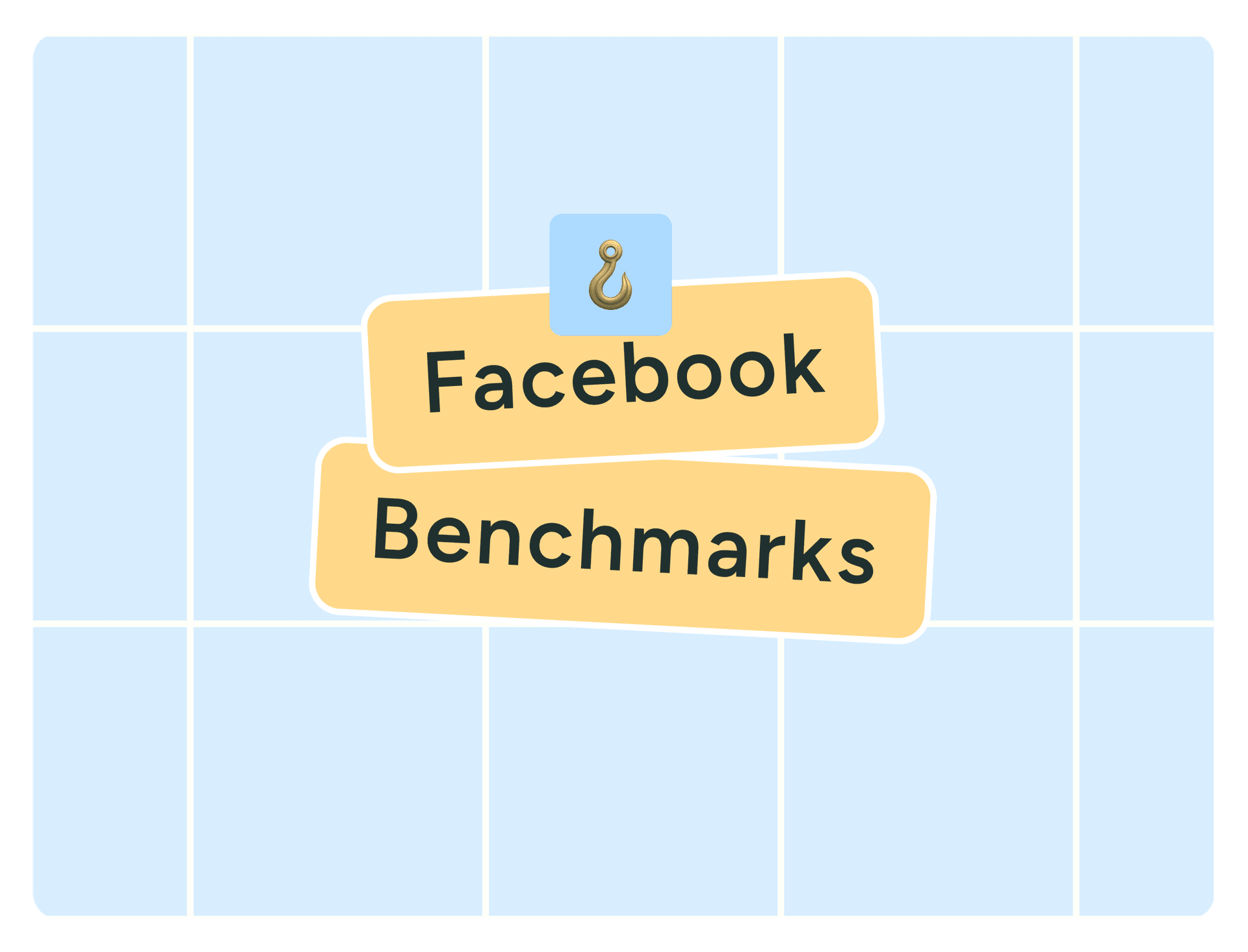With its massive reach, flexible content formats, and built-in engagement, Facebook is still one of the most powerful marketing tools for creators and small businesses.
“For brands targeting Millennials, Gen X, or niche communities, Facebook is where real conversations are still happening,” says Cashé Collocott, founder of Kidd Digital, a boutique social media agency, “You just need to know how to show up strategically.”
As a creator and marketer who lives on Facebook and runs my own Facebook group, I can personally attest to the power of the platform for building your brand and connecting with the right people. You just have to know how to use it.
Here’s how a smart Facebook marketing strategy can help you harness a platform of over 3 billion active users.
Jump to a section:
- What is Facebook marketing?
- The top 5 benefits of Facebook marketing
- Is Facebook marketing right for your business or brand?
- Getting started: How to set up your Facebook account
- How to create a Facebook marketing strategy step by step
- What to post on Facebook: the main content types
- Best practices and Facebook marketing tips
- How to grow and engage your audience on Facebook
- Facebook advertising basics
- Track your performance with data-driven Facebook marketing
- How a social media marketing tool helps you show up and stay on track
- More Facebook resources
- Facebook marketing FAQs
What is Facebook marketing?
Facebook marketing refers to using Facebook’s tools (like Facebook business pages, ads, groups, and reels) to build your brand, connect with your audience, make some sales, grow your following, or whatever it is that you want to achieve.
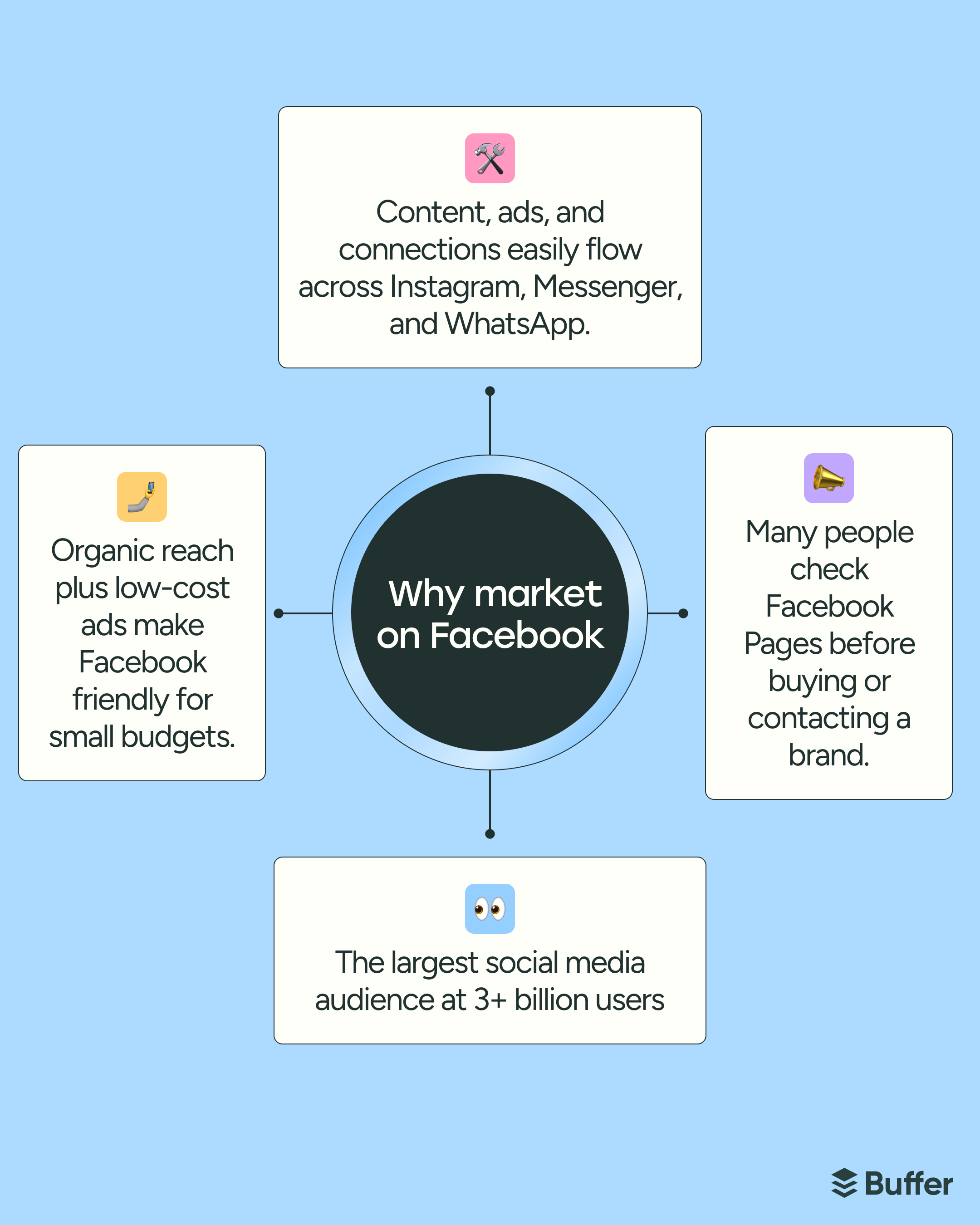
For creators, small business owners, and marketers, Facebook marketing is all about showing up consistently, building trust, and reminding folks why they followed you in the first place. Think of it as your digital storefront, community board, and word-of-mouth network, all rolled into one scrollable feed.
The top 5 benefits of Facebook marketing
With billions of active users and powerful tools to help you reach exactly the right people, Facebook is still one of the best places to grow your brand online. Let’s break down the top five reasons why Facebook marketing deserves a spot in your strategy.
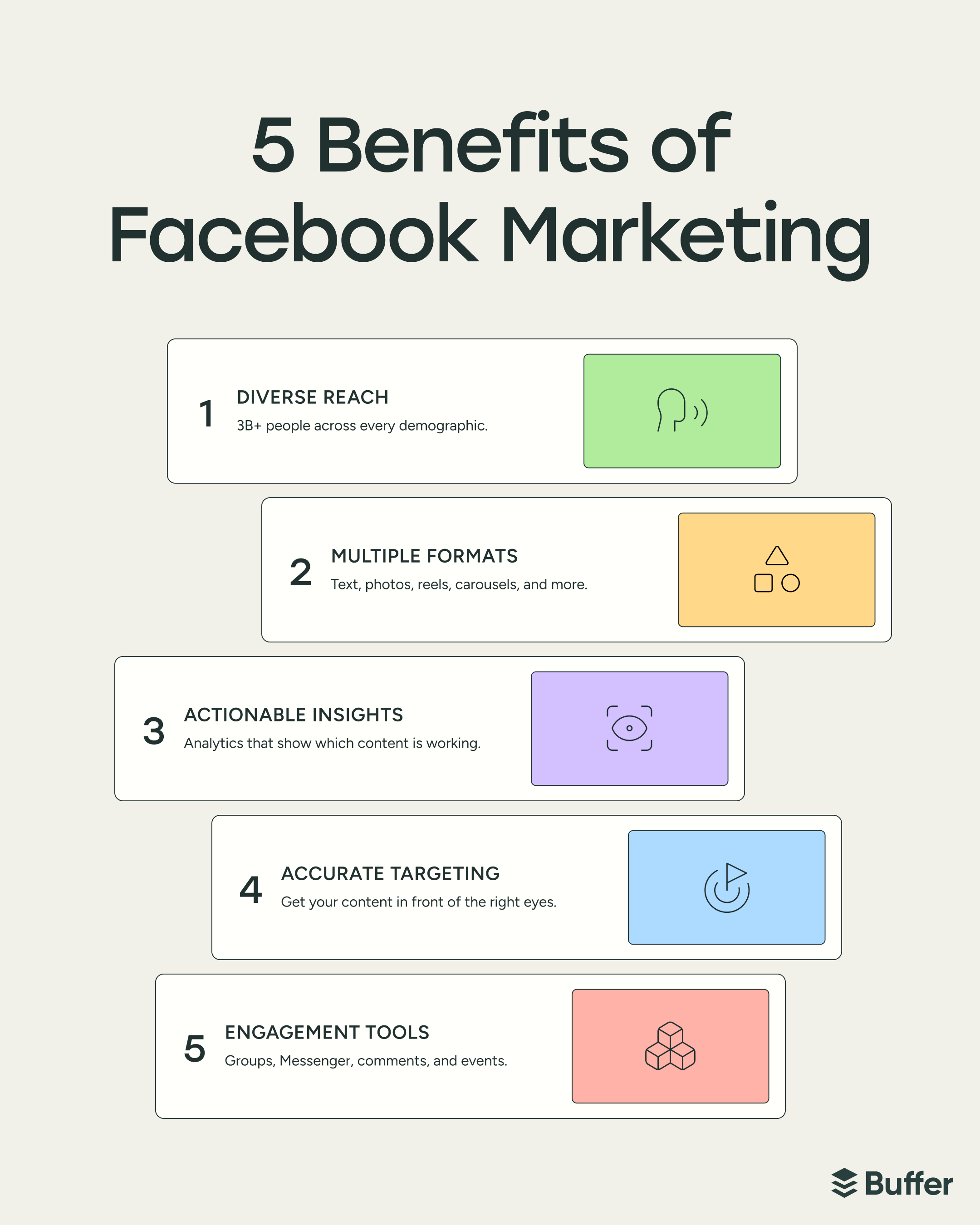
1. Massive and diverse reach
With over 3 billion monthly active Facebook users, the social media giant remains the most-used globally (as an active user, I feel pretty validated by my choice of social media platform right now).
The ability to get in front of such a vast audience offers incredible opportunities to connect with new customers across various demographics. Whether your audience is local or global, cat lovers or coffee snobs, there’s a good chance they’re on the scroll right now.
2. Get your content in front of the right eyes
Facebook’s targeting tools are like matchmaking for marketers, helping your posts reach people who will actually care. You can filter by interests, behaviors, location, and even life events. Basically, it’s less shouting into the void and more speaking directly to your people.
3. Multiple content formats to tell your story
From long-form social media posts and photo carousels to videos, stories, and reels, Facebook lets you tell your story your way. Whatever your vibe and your goal, there’s a format that fits.
4. Built-in community and engagement tools
Facebook makes it easier to show up, connect, and build your own little corner of the internet with tools like:
- Facebook Groups
- Messenger
- Comments
- Events
- Live video
- Polls and questions
- Reactions and replies
Personally, Facebook is my go-to for finding local events in my area. So much so that my friends who aren’t on Facebook come to me to ask about the latest happenings. (To any skeptics out there: I’ll make a Facebook fan of you yet.)
Yay, I have a Mother’s Day Sip & Sketch coming up:
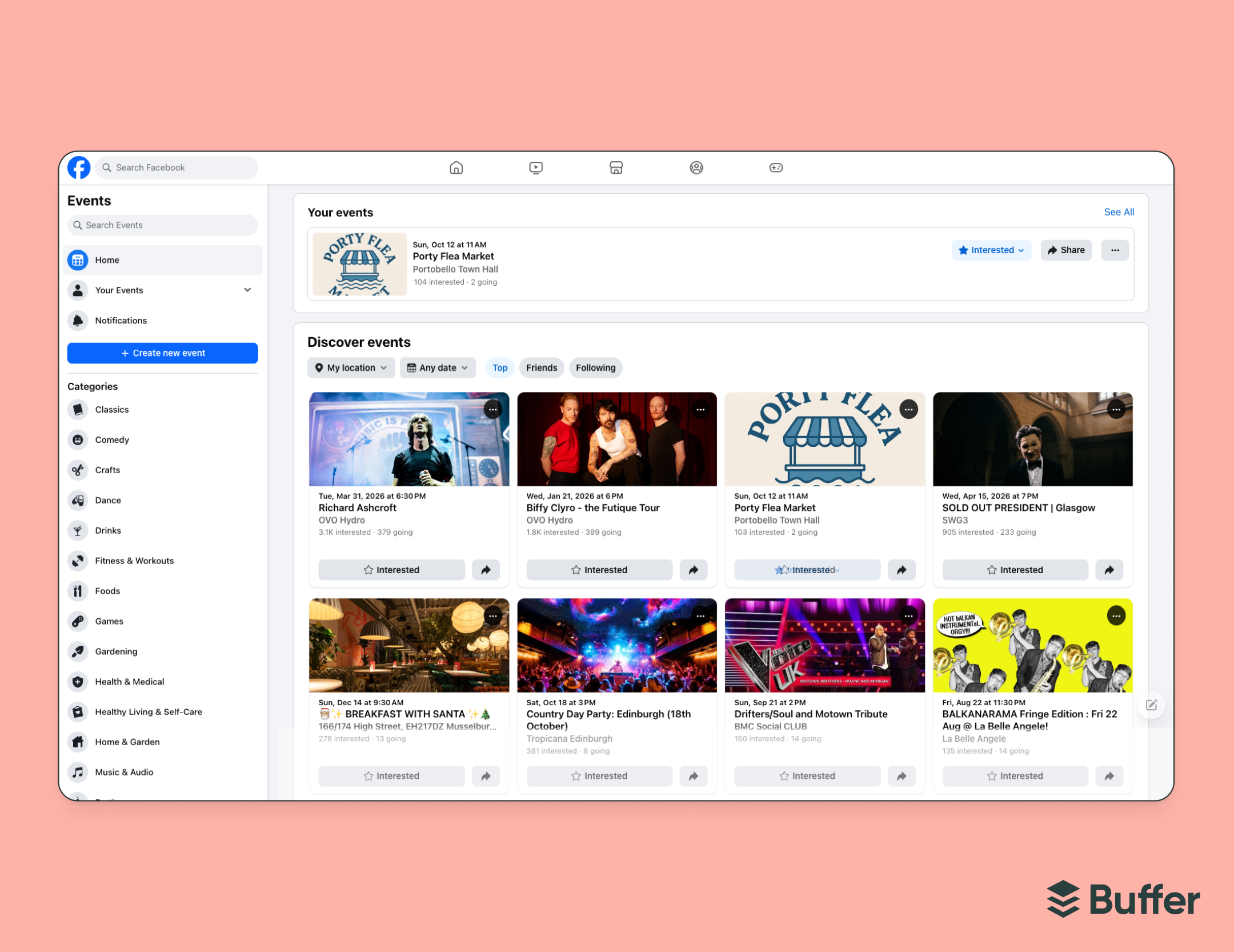
5. Actionable insights and Facebook analytics
I know that numbers aren’t everyone’s thing (even me). But when they show you what’s working (and what’s flopping), they’re worth a second look. Facebook’s analytics help you track reach, clicks, engagement, and more, giving you the data to help refine your Facebook marketing strategy over time.
In my Facebook Group, Freelancers Who Work Smart, Not Hard, I can see that my views are up, but my engagement (posts and comments) is down. This tells me that the group is attracting more people, but perhaps not the right people. Or, it’s attracting the right people, but they’re not getting enough value to engage (I confess, it may be the latter).
So, what can I do? I need to focus on providing real value for my target audience so that they don’t just click and leave.
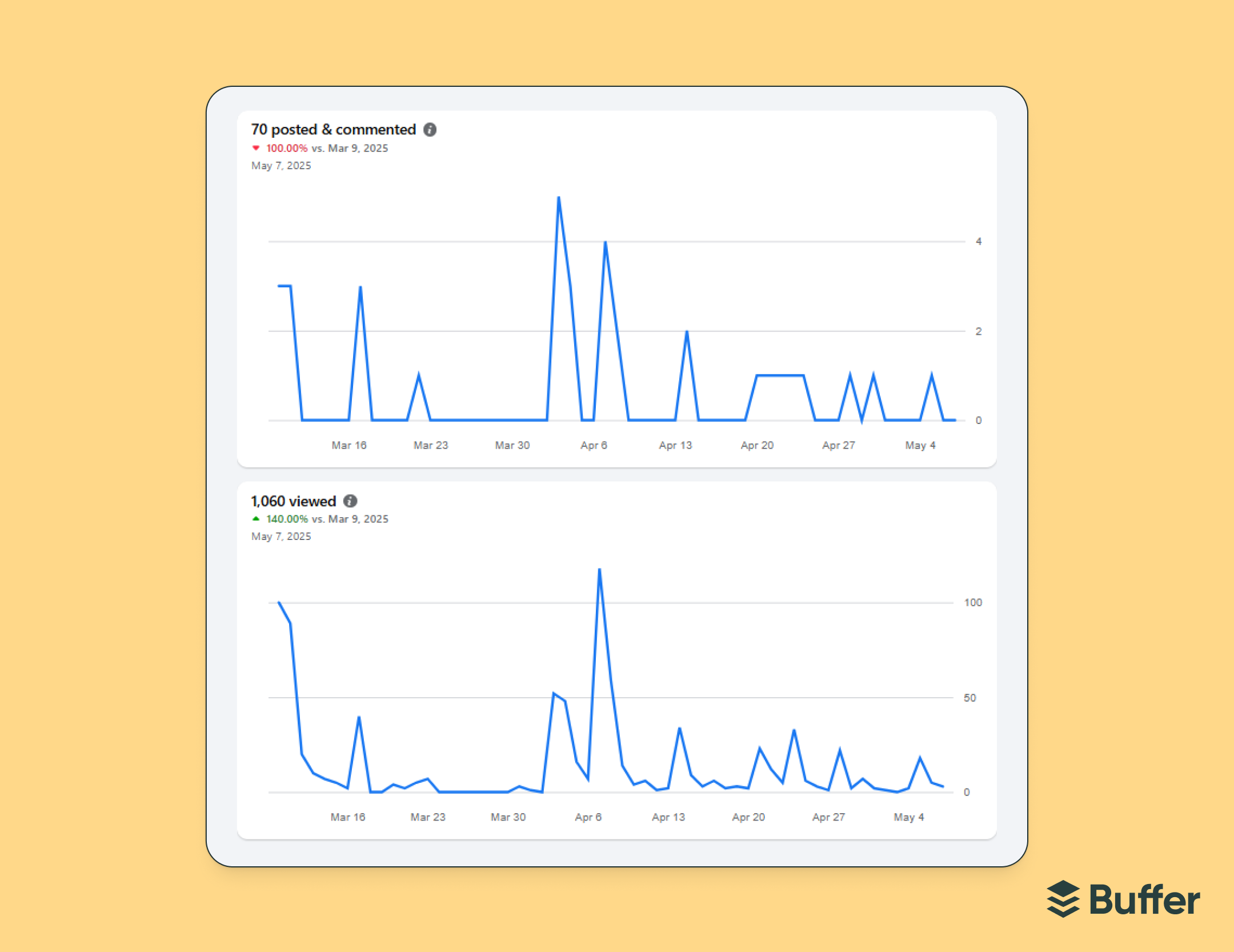
I hope these pointers got you fired up about Facebook. That said, as a creator or small business, you still need to be selective about which social media platforms you use. You don’t want to risk burning out by trying to be everywhere all the time.
Is Facebook marketing right for your business or brand?
Short answer: If your audience is on Facebook, you can be successful on the platform.
Longer answer: If you only have time to focus on one or two social media platforms as a creator or small business marketer, you want to make sure that you’re choosing the right ones.
Here’s how to find out if Facebook makes sense for your brand:
Ask your audience
The easiest way to find out if Facebook is a good place to reach your audience is to ask them.
If you have an email list, send a brief survey asking about their social media habits. Ask which platforms they use most often and where they like to follow brands. No email list? No problem. Just be a human being and chat whenever you have a chance, whether that’s at the checkout in your physical store, on your other social platforms, or next time you meet with them.
Compare your target audience to Facebook users
Different audiences are more active on certain social media platforms than others. You can compare the demographic (gender, age, geographical location, income, etc.) and psychographic traits (interests, values, beliefs, and personality) of your target audience with the social media platforms you’re considering.
Look at your competitors
If businesses like yours are racking up likes and sparking conversations in the comments on Facebook, chances are your people are hanging out there, too.
If your competitors aren’t on Facebook, it might be a sign it’s not where your audience spends time… or it might be your chance to stand out. If people have told you they’d follow you there, you could be ahead of the curve, ready to claim a little space before anyone else does.
Case in point: Buffer 👋. We have a Facebook page, but use it sparingly. We’re a small team, so it makes more sense for us to focus on platforms that our customers and community use frequently (right now, that’s LinkedIn, Instagram, Threads, and Bluesky).
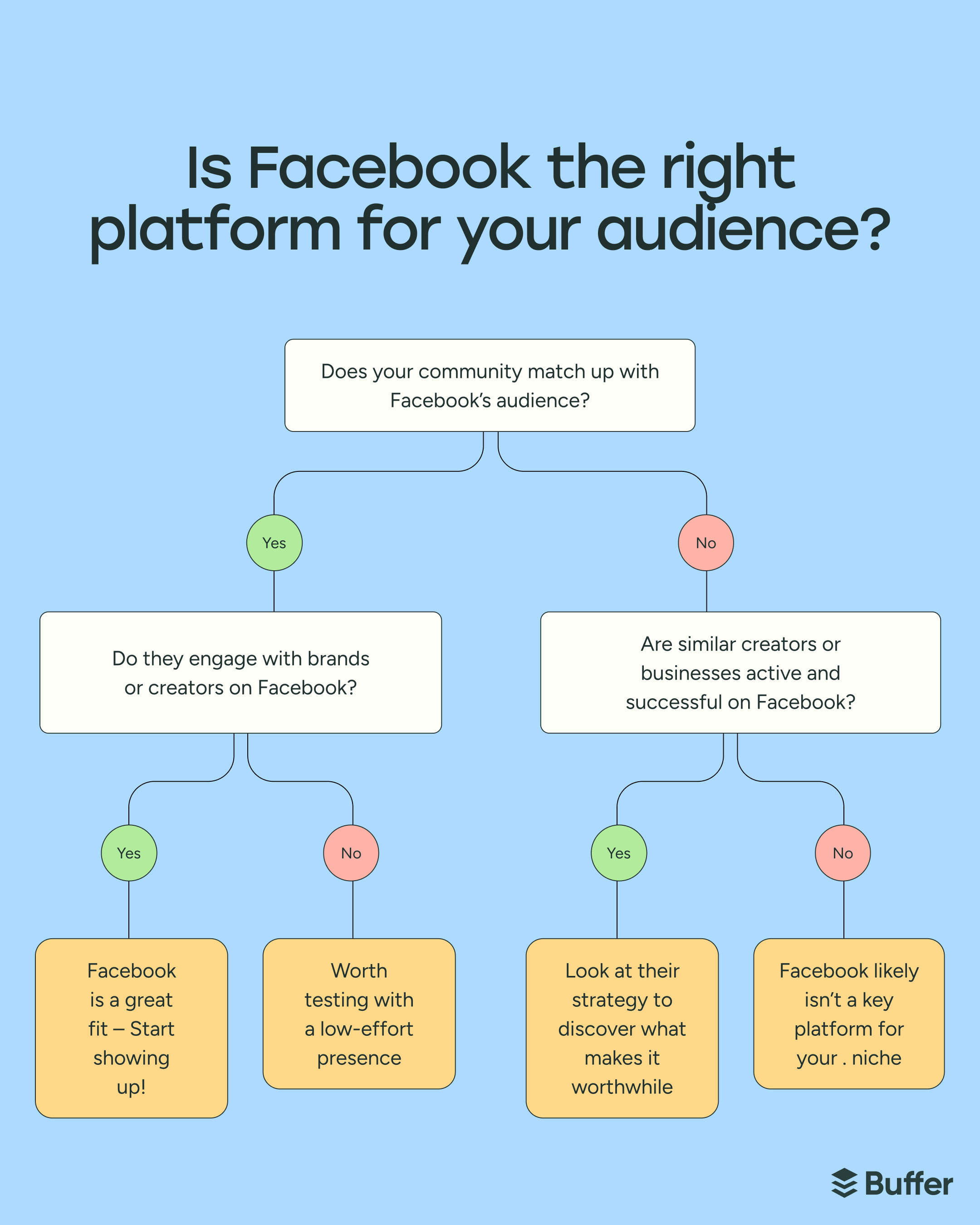
Getting started: How to set up your Facebook account
There are two ways to get set up on Facebook – as a creator or as a business. Here’s how:
How to set up Facebook as a creator
Whether you’re sharing your art, your expertise, or your side projects, Facebook can help you build an audience that actually sees your work. Here’s how to get started:
1. Choose between a Facebook business page and professional mode
For a Facebook creator, both a Facebook Page and professional mode on your profile offer ways to build a public presence and potentially monetize your content.
What’s the difference?
- A Facebook Page is a separate entity for public figures, businesses, or brands.
- Professional mode transforms your existing personal profile into a creator-focused presence, while still keeping your personal connections separate. You can access creator tools and monetization features from within your profile.
According to Facebook for Creators, Facebook Pages offer more advanced tools and features, while professional mode provides a streamlined experience for creators.
How do you choose?
- If you want a separate public presence, a Facebook business page is the better choice, as it allows you to create a professional identity separate from your personal profile.
- If you want to use your existing profile for your creator journey, professional mode is a good option, as it lets you build a public presence and maintain your personal account and network in the same place.
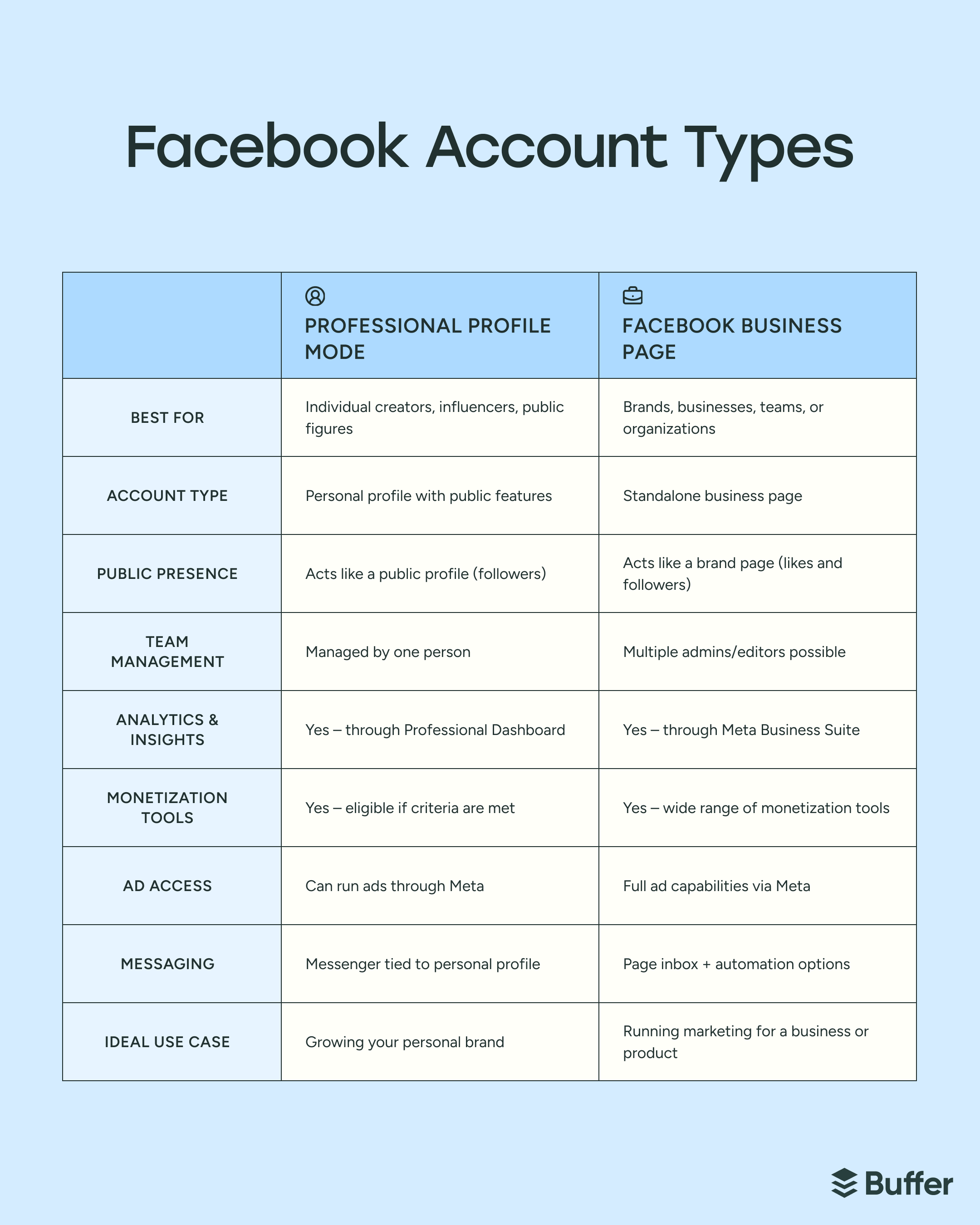
Cashé switched to professional mode recently: “If I’m preaching connection and authenticity for my clients, I’ve got to walk the talk too, right? This is the perfect way to let people see behind the polished — or let’s be honest, overthought — content.”
“Professional mode lets me test content themes, track what actually lands, and stay visible to the right audience without juggling multiple pages,” she says.
“Facebook’s professional mode made it easier to automate my organic growth. It gave me reach beyond what a regular personal page could do — like auto-invites and growth prompts,” says Aiza Coronado, a lifecycle strategist, writer, and co-founder.
You can create both a business page and your own professional profile, but it will take some extra work to keep both active and updated, and you’ll end up diluting your audience, so it’s probably a better idea to choose one.
This is what a professional profile looks like: same as a regular profile, but with the Follow button:
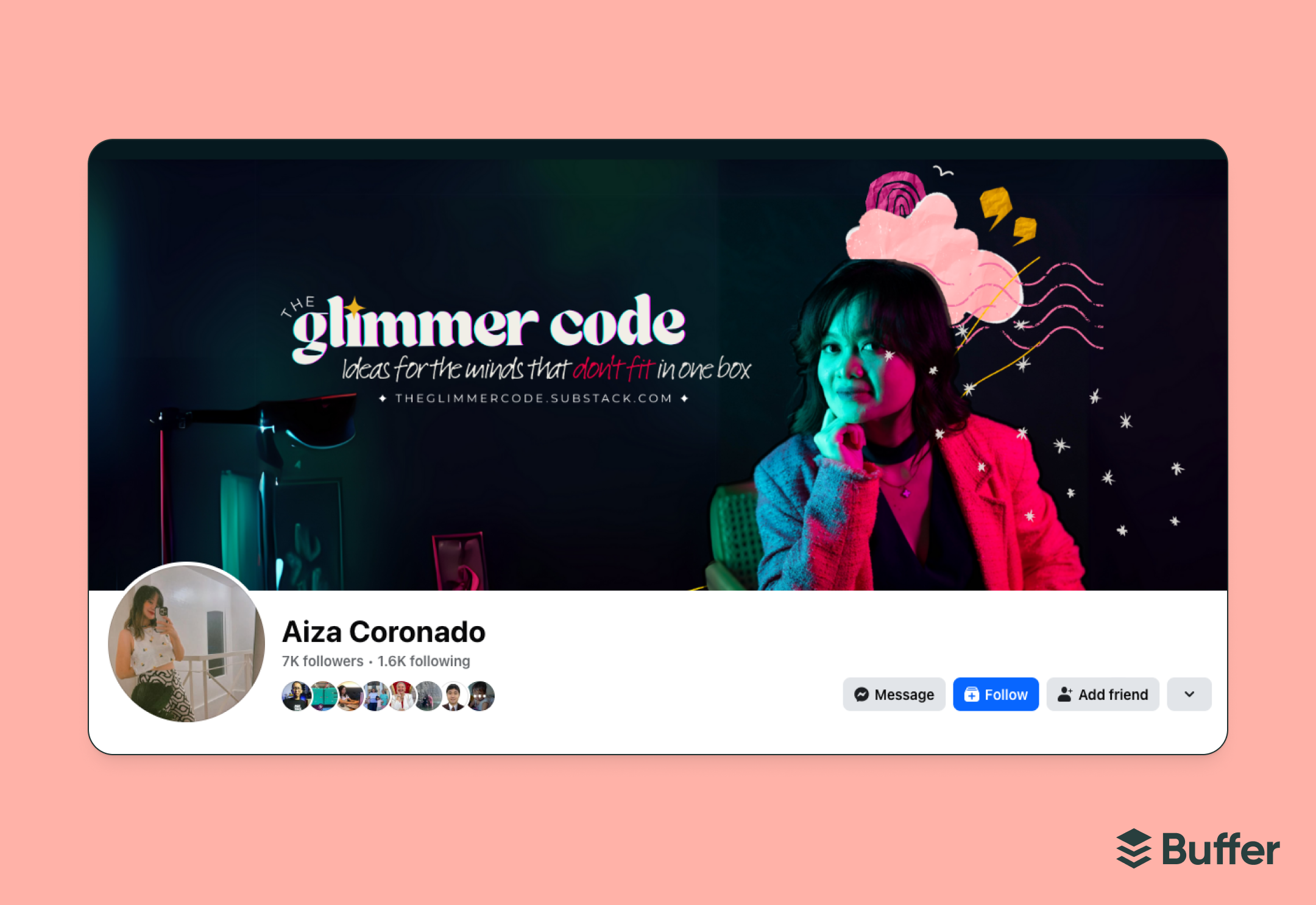
Going for professional mode? The next steps show you how to set it up.
2. Go to your Facebook profile: Head to your profile on the Facebook app or website.
3. Tap the three dots: You’ll see them near the top right of your profile. (Note: you’ll need to make sure that your profile is unlocked.)
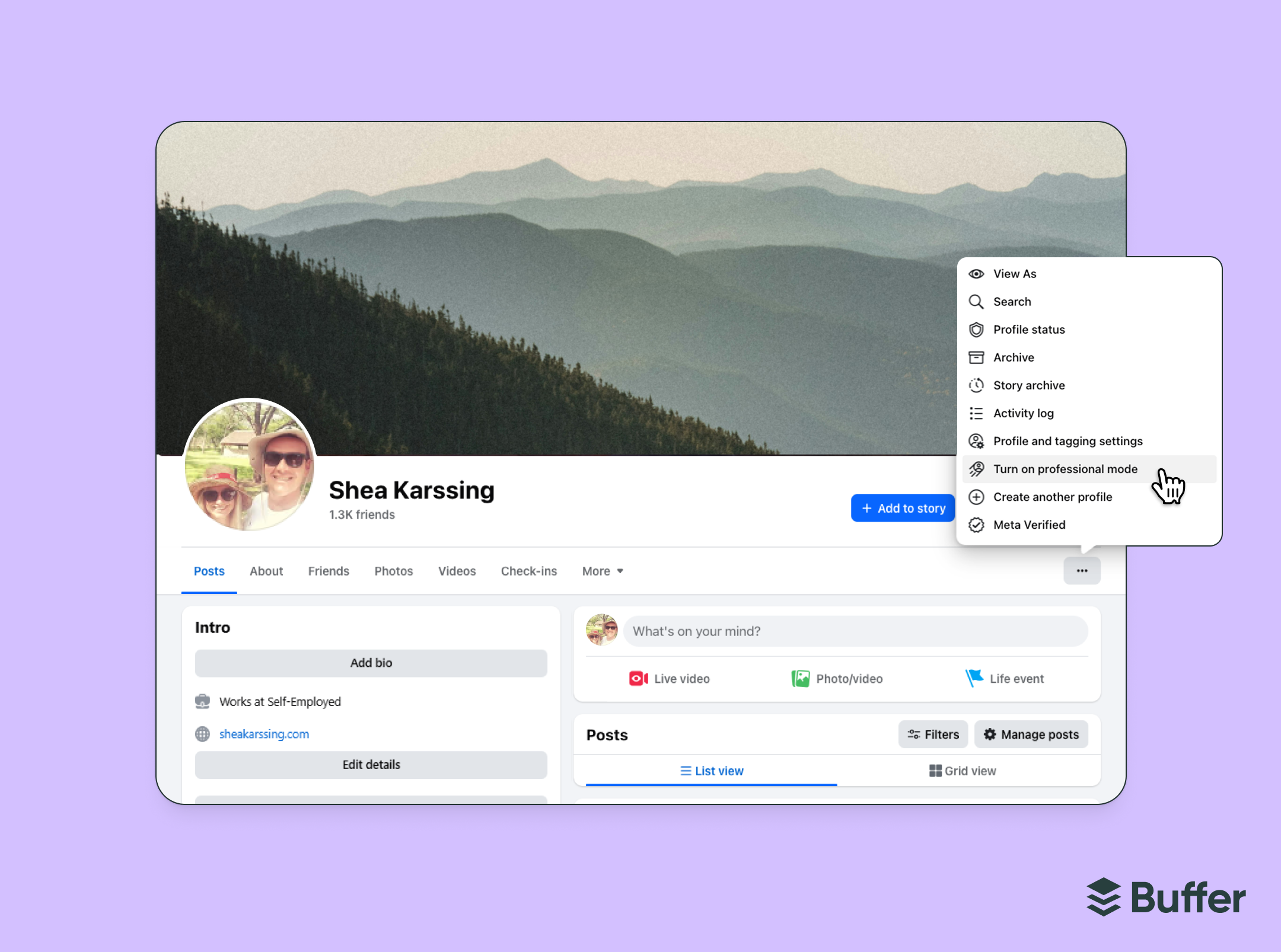
4. Select "Turn on professional mode": Scroll down and choose the "Turn on professional mode" option.
5. Confirm and proceed: Facebook will walk you through a few quick setup prompts, like picking a category for your content.
6. Start exploring the tools: Once professional mode is on, you’ll get access to a professional dashboard with insights, post performance, and more.
How to set up Facebook as a business or brand
Having a page on Facebook is similar to having a website on the Internet. In just a few steps, you can create a Facebook Page that helps people find you, trust you, and buy from you, even if they’ve never heard of you before.
1. Create a Facebook business page
A personal profile is great for friends and family. But if you’re running a business or brand, you’ll need a Facebook business page to unlock professional tools, analytics, and ad options.
- Go to facebook.com/pages/create.
- Choose Business or Brand as your category.
- Fill in your name, bio, website (if you have one), and a profile and cover image.
Pro tip: Use your logo as the profile image if you're a brand. If you're the face of your business, a clear, friendly headshot works best.
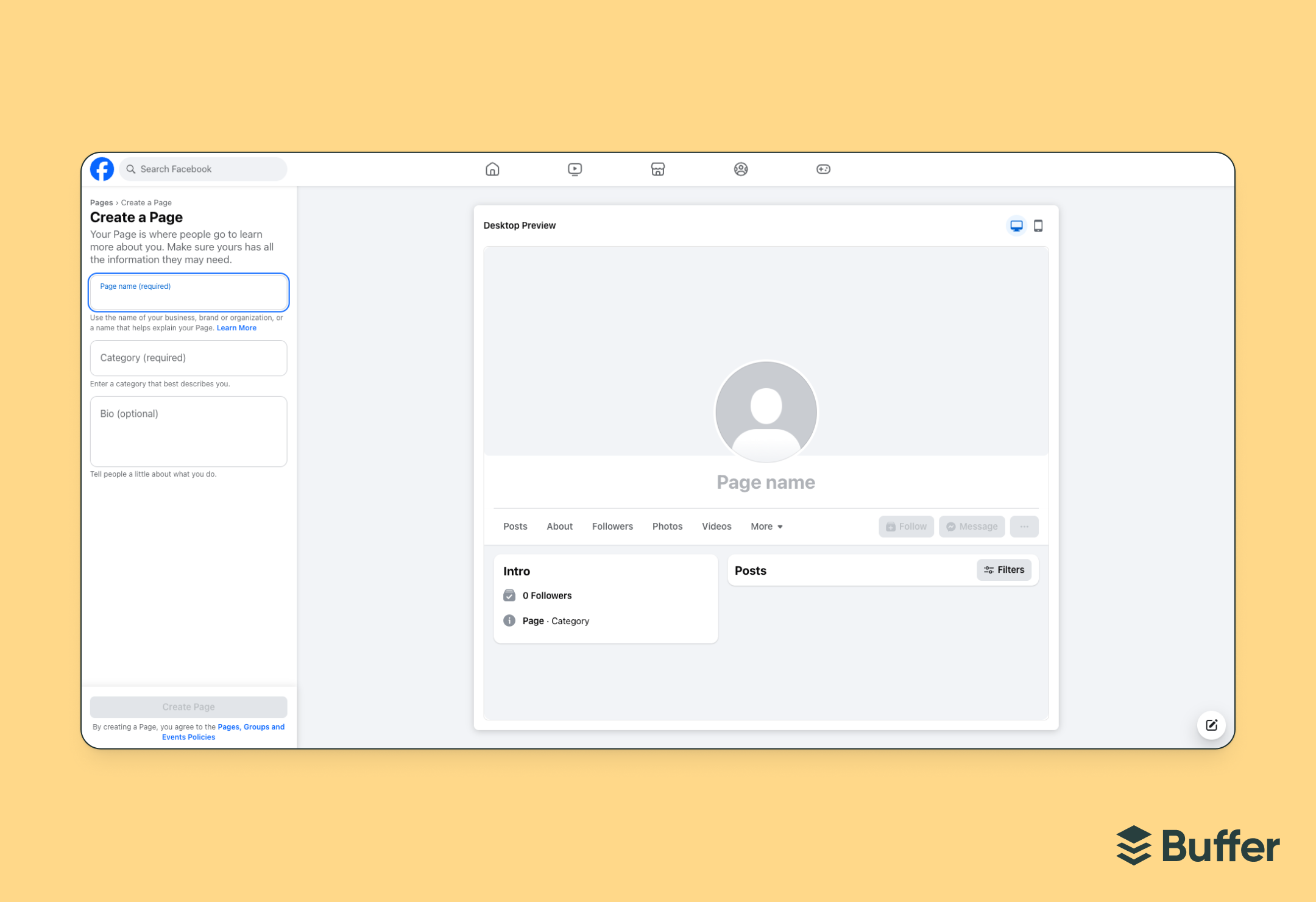
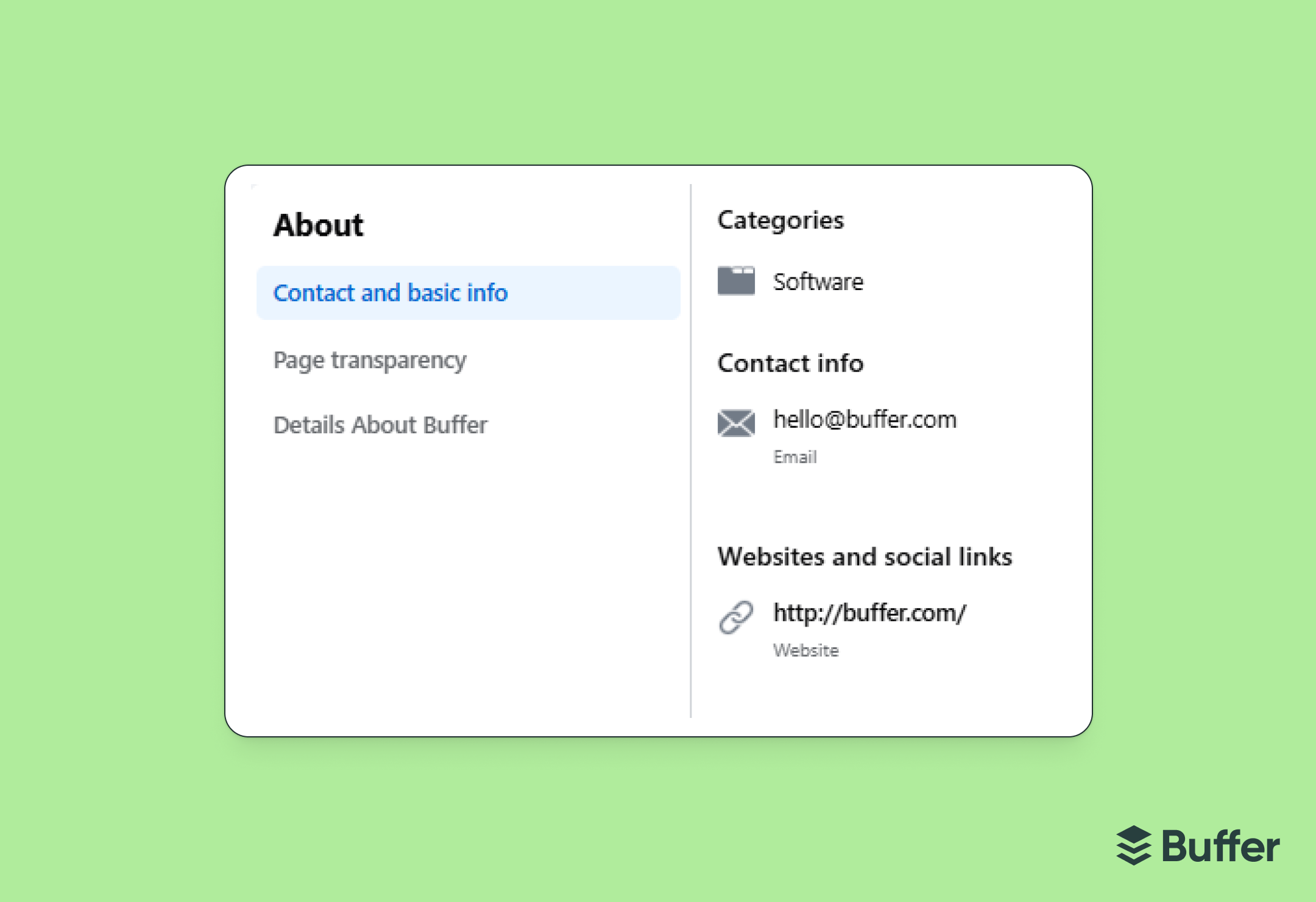
2. Add business details
People will check your Facebook Page for basic info before they reach out, so help them know you’re legit and get in touch.
Fill in:
- Business category
- Contact info (email, phone, or Messenger)
- Hours of operation (if relevant)
- Location (especially if you’re a local business)
- Customize the sections you want on your page
Pro tip: Edit the "Action Button" to direct visitors to take a specific action, such as visiting your website or contacting you.
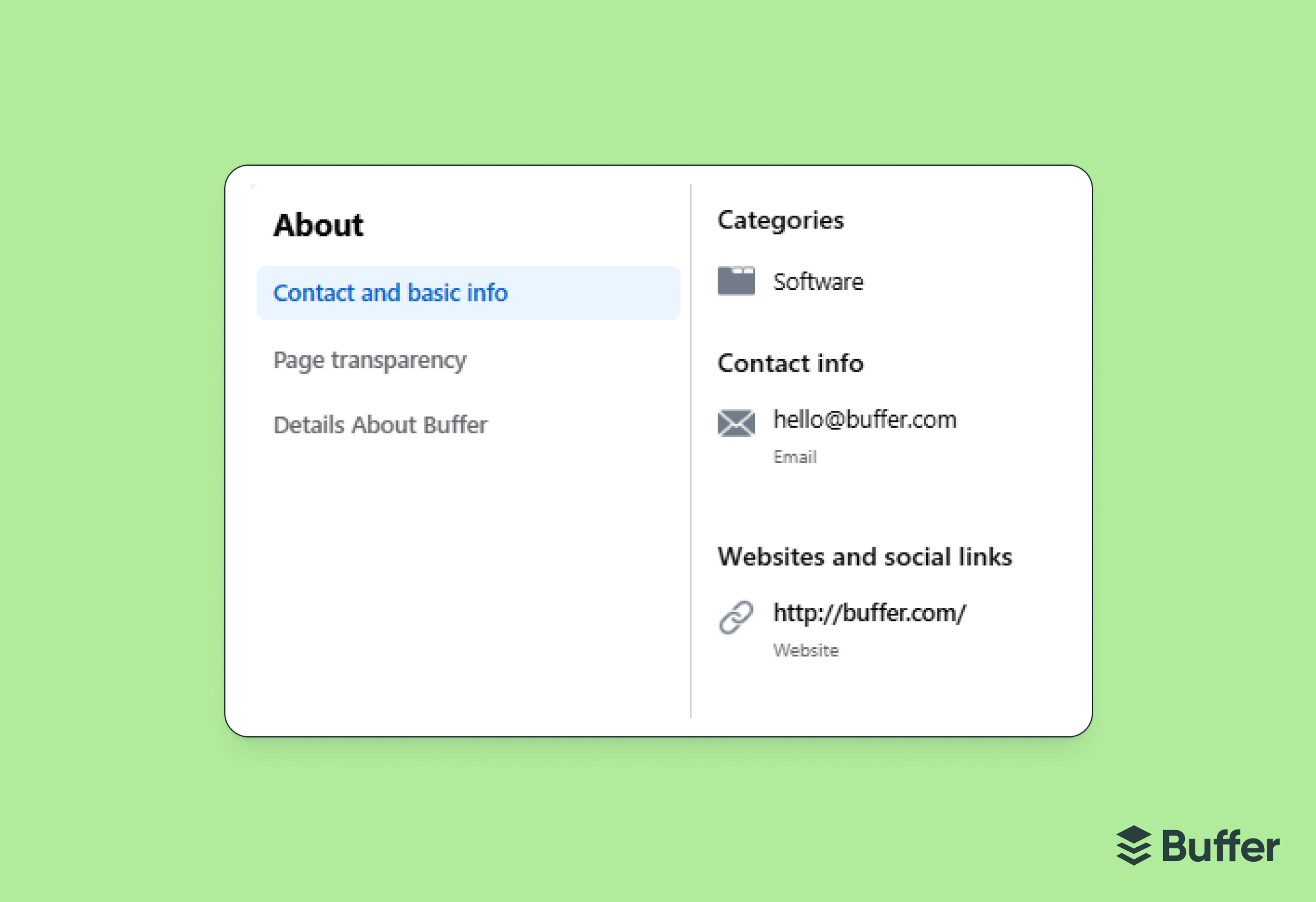
3. Build your audience:
- Add collaborators if you work in a team.
- Invite friends and other potential followers to like your page.
- Turn on page notifications on your profile to receive updates about your page.
4. Finalize and start posting helpful, human content
- Review all the information and click "Done".
- Share updates, behind-the-scenes photos, customer stories, and product tips.
Pro tip: Focus on being useful and personable. People want to know the face (or mission) behind the brand.
Now you’re ready to draw in fans and followers🥳.
How to create a Facebook marketing strategy step by step
Aiza started her The Content (Climber) Club Facebook Group as part of a challenge that her business coach set for her. Fun fact: the group helped pick the name.
One mistake Aiza made was not being strategic from the start.“The group began as part of a challenge — no clear goals, no plan. There were months of inactivity, and I didn’t get much out of it early on because I had nothing to sell,” she shared.
“Another miss was no proper onboarding for new members. That early excitement of new joiners faded fast, and I could’ve kept people more engaged if I’d built a simple welcome flow.”
But as Aiza got clearer about her purpose, the group began to reflect that. Today, it’s a thriving space for freelancers and founders to swap ideas, support each other, share their wins, and even help name new projects.
The lesson here: Whether it’s a page or a group, Facebook can become a powerful platform for growth and connection, but only if you’re intentional about it.
You don’t need a full-blown social media marketing department to make Facebook work for you; just a clear plan, a little consistency, and a strategic starting point. Here’s how to build a Facebook marketing strategy that actually supports your goals (and doesn’t just sit in a Google Doc forever).
Define your goals and track what matters
Before you start posting, ask yourself this one question: What does success look like?
Maybe it’s more engagement, more sales, or just more people knowing you exist. You can pick one or two goals to start.
Pro tip: Tracking likes, clicks, shares, or DMs gives you real signals about what’s working (and what’s not). Facebook’s built-in insights tool can tell you a lot; more on this later.
Identify your target audience
Ask yourself: who am I talking to? And try to avoid saying ‘everyone’ — it’s too broad to be useful😉.
The more you know about your audience’s interests, problems, and online habits, the easier it is to create content they’ll actually care about.
As I always remind my clients: narrowing your audience doesn’t mean shutting others out; it just means your right people will actually pay attention. Speaking directly to “freelance designers looking for time-saving tips” doesn’t exclude all designers — it simply makes the ones who need your help feel like you’re reading their mind.
Here’s a quick example:
- Too vague: “Attention all small business owners!”
- Irresistible to the right person: “Overwhelmed trying to market your handmade jewellery between Etsy orders? Here’s a content plan that fits in your tea break.”
See the difference? When your audience sees themselves in your content, they’re more likely to stop, click, and remember you.
Plan your content calendar
Consistency beats complexity. Regular posting not only keeps your audience engaged but also signals to the algorithm that your content is active and relevant.
- Start by mapping out a week or two of posts at a time.
- Aim for a healthy mix of product updates, personal insights, customer love, how-to tips, reels, and the occasional meme if it fits your brand.
Your Buffer dashboard makes it easy to see what you have planned on various platforms:
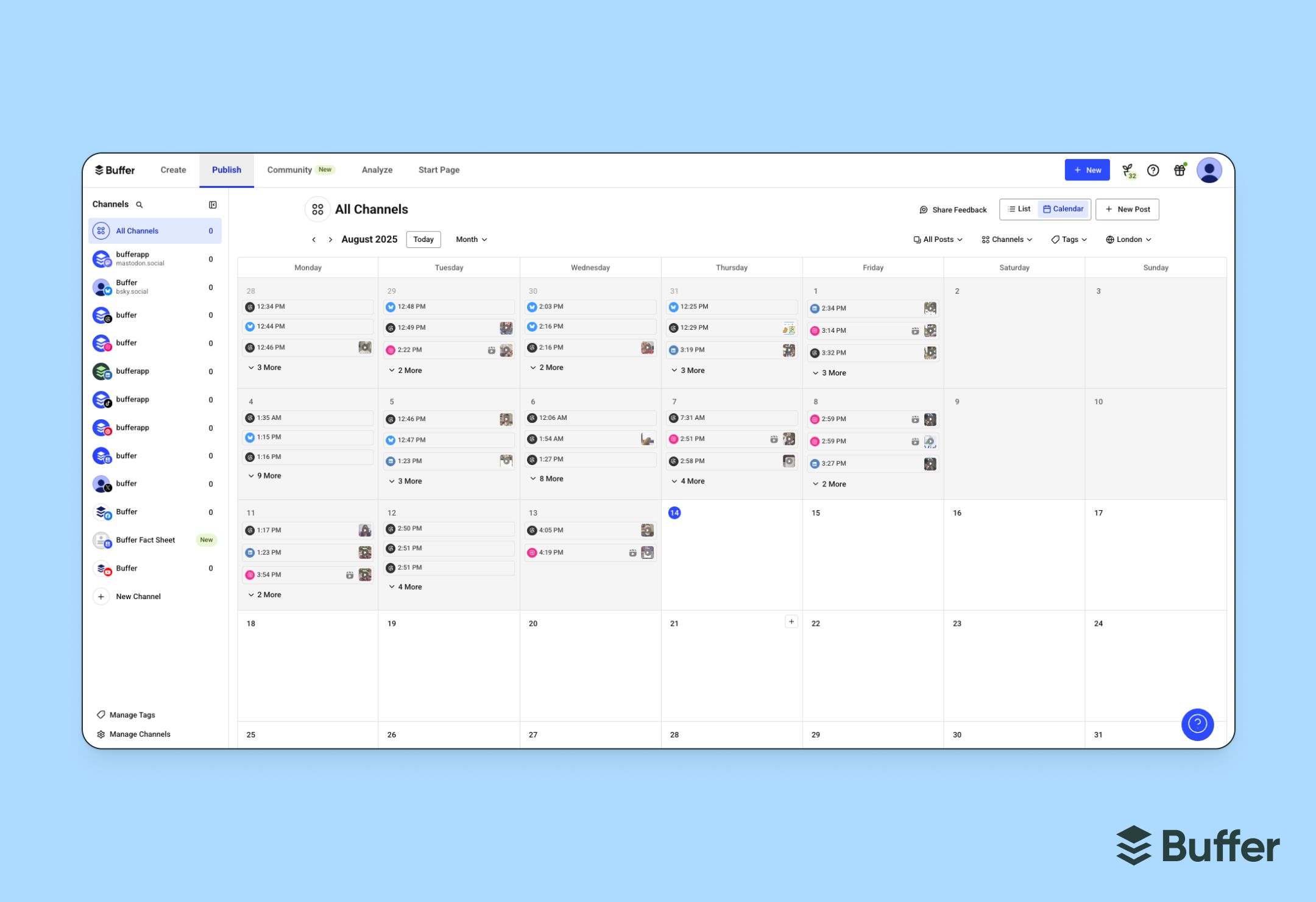
How to learn from what’s working (and what’s not) and refine your Facebook marketing strategy
When you’re starting out, your follower and engagement numbers might be small (I still get excited when someone comments on one of my group posts) — and that’s totally normal. What you want to see is steady improvement over time.
- Keep an eye on which posts get the most likes, comments, shares, or clicks
- Look for patterns, like certain topics, formats, or posting times that stand out.
- Use that data to guide your next steps.
- Don’t be afraid to experiment.
Over time, you’ll learn what works for your audience and build a presence that grows with your goals. And every now and then, a post takes off in ways you never expected.
That’s exactly what happened with Aiza’s viral post. It wasn’t planned — it was personal. Right after watching Inside Out 2 with her family, Aiza wrote a quick reflection. It was raw, emotional, and straight from the heart. She posted it to Facebook while the feelings were still fresh. By morning, it had gone viral, with 17k shares.
“The themes in the movie aligned so closely with what I teach in my content writing course — how your beliefs shape your voice and visibility,” she says. “I was also reading Contagious at the time, so emotion and storytelling were top of mind. People connected to it. It felt timely, true, and relatable.”
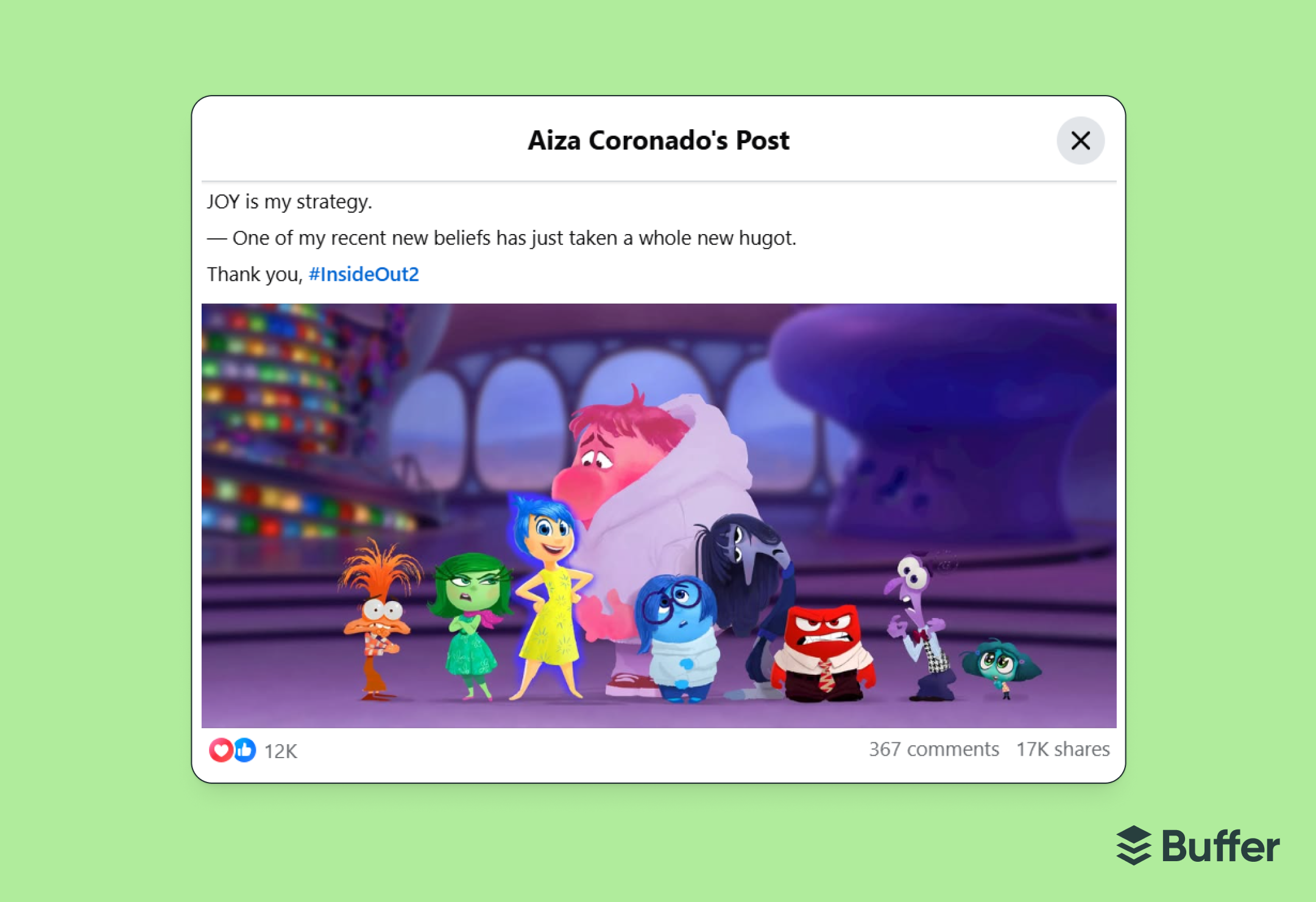
One thing's clear: emotion and storytelling still win on Facebook.
“The defining moment was realizing it went viral not just because it was trending,” Aiza says, “But because the message resonated. That was the kind of validation I needed as a writer.”
You can read the full post here.
What to post on Facebook: the main content types
Every type of content has its place on Facebook, and it’s worth using all of them depending on how you’re trying to engage your audience.
- Text posts
- Photo posts
- Link posts
- Stories
- Reels and video posts
- Image carousels
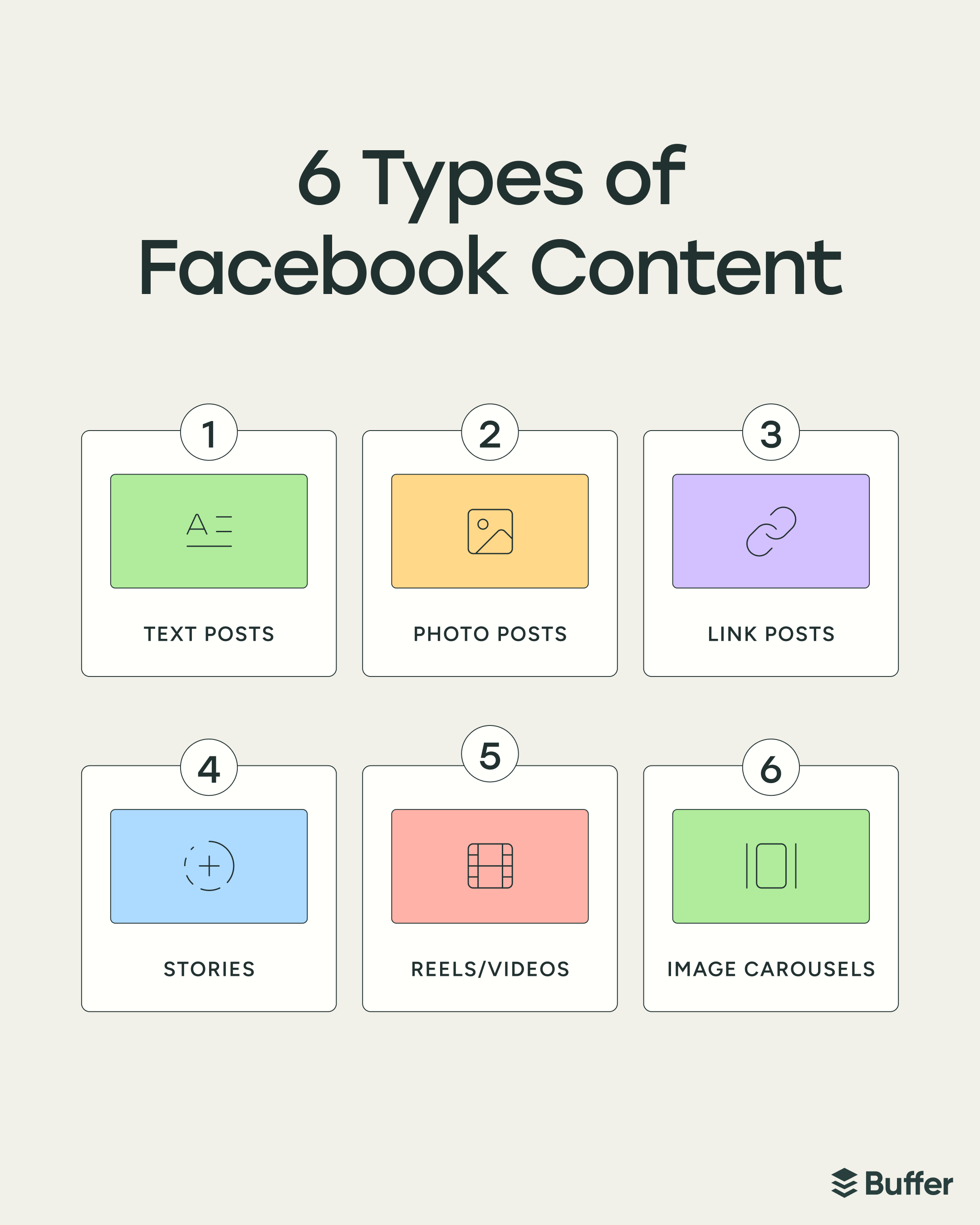
Let’s look at each one in more detail:
Text posts
These are great for sparking conversation or providing important information. “When I want to share thoughts or ask people to comment if they’re interested in something, plain text works best,” Aiza says. She’s also had success using short text posts to test demand before launching something new.
Ahead of her LinkedIn Challenge earlier this year, she used a series of simple posts to build interest. Over 350 people signed up, all organically. By Day 1, engagement inside the challenge hit 730+ comments on a single post.
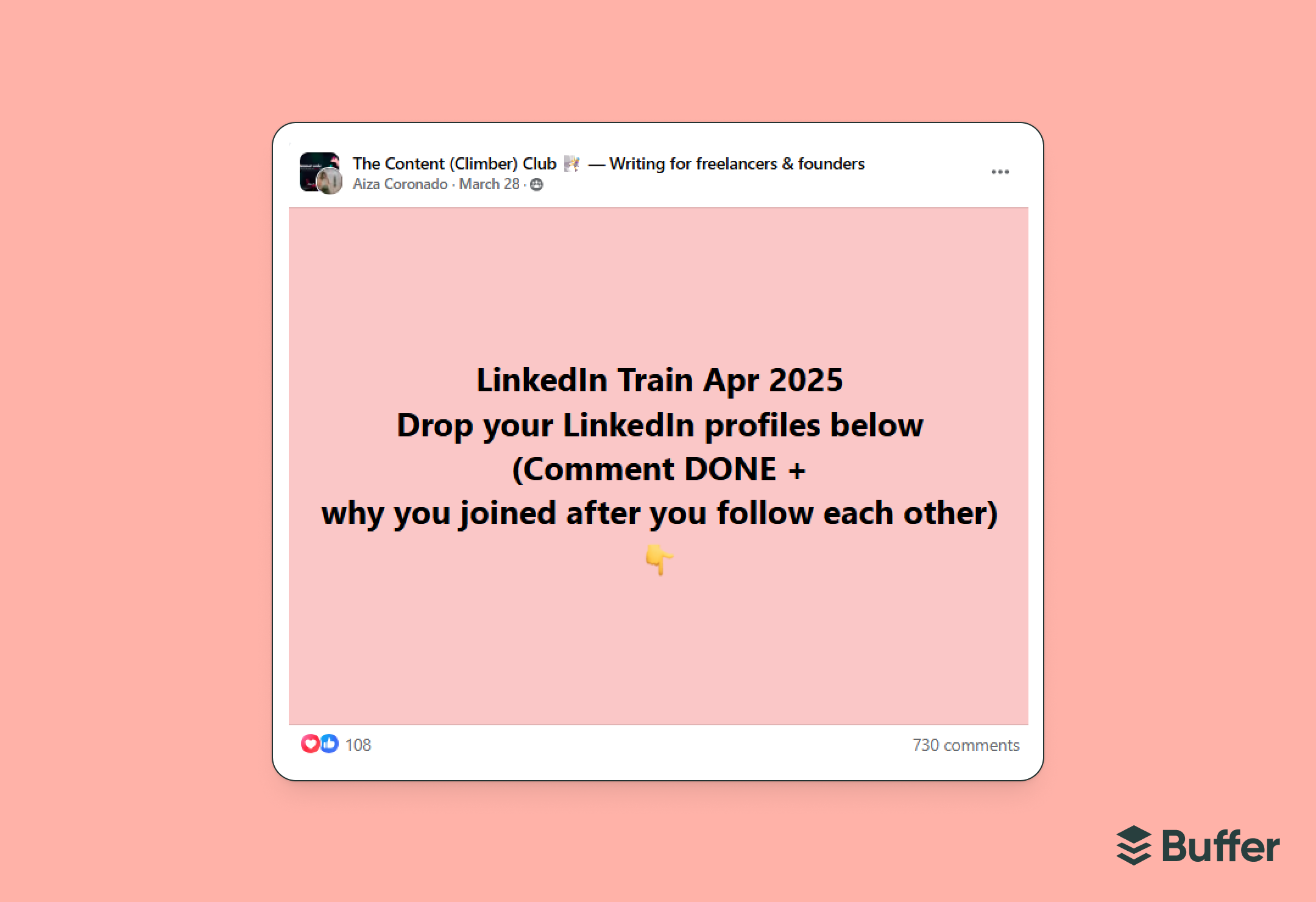
Photo posts
Facebook posts with photos or images (like the infographic below) catch people’s attention when they’re scrolling their Facebook Feed. It’s no surprise that this format gets the most engagement on the platform.
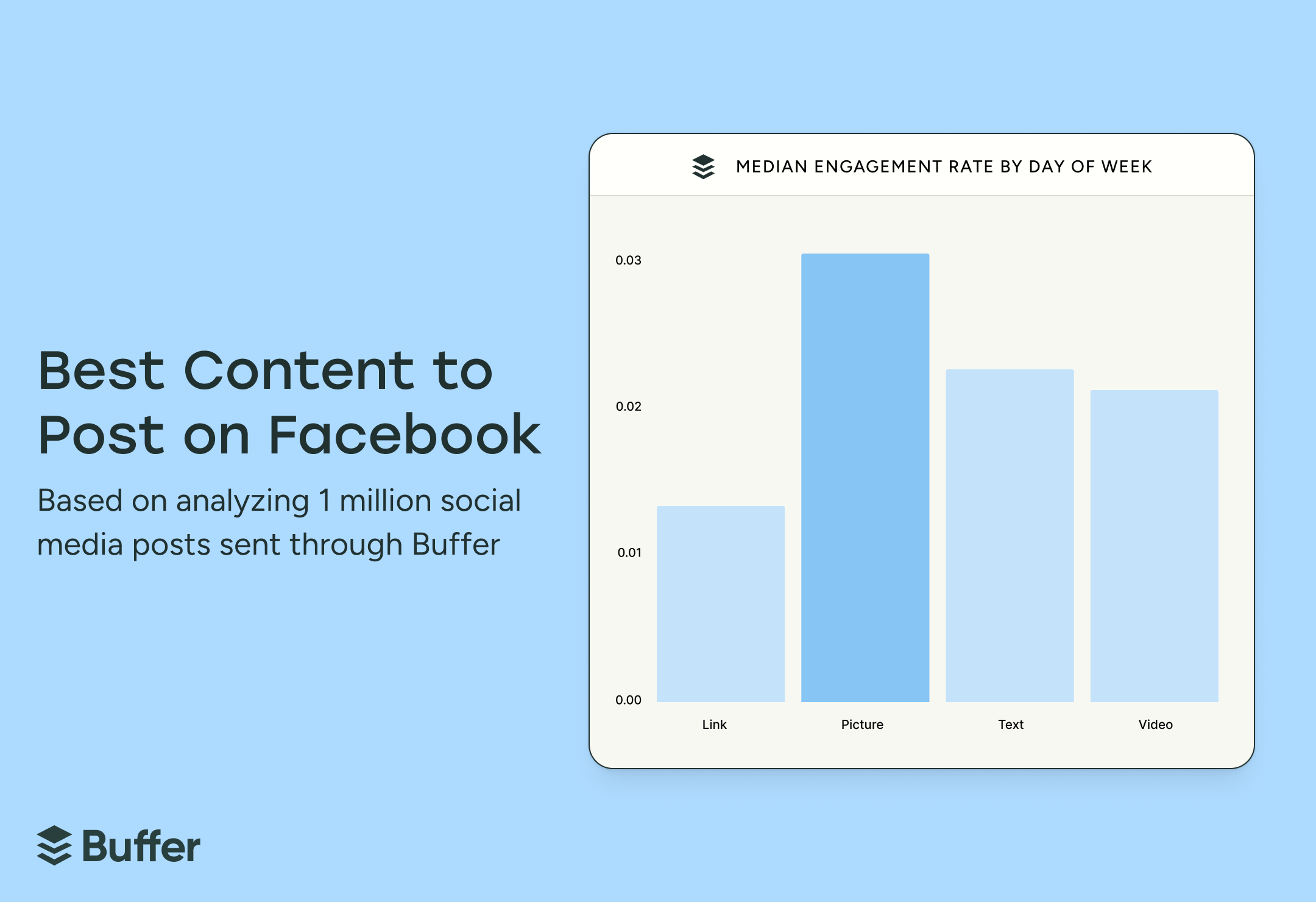
Image posts can have one or multiple images. For single-image posts, the image will be resized to 500 pixels wide, and the height will be scaled accordingly.
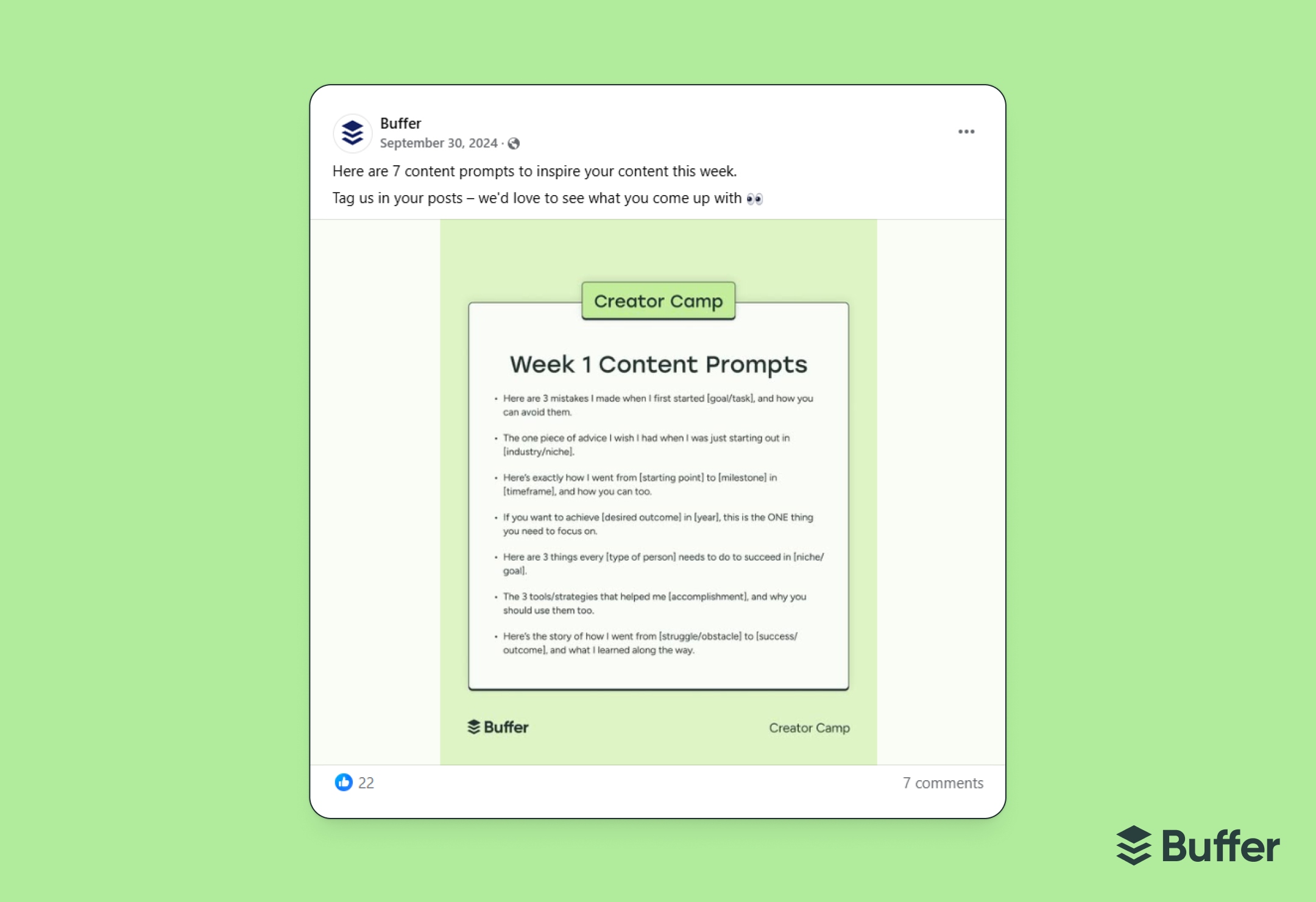
Link posts
Posts with links show a preview of the website, so the visuals can catch more attention than a plain-text post. Use these when you want to encourage a specific action, like shopping a sale or promoting a blog post.
It’s worth noting, however, that according to Meta’s latest “Widely Viewed Content Report,” 97.3% of all post views on Facebook (in the US) go to updates that don’t include a link to a source outside of the app. As a workaround, you can try including the post link in the first comment if you’re starting to see a decline in link post performance.
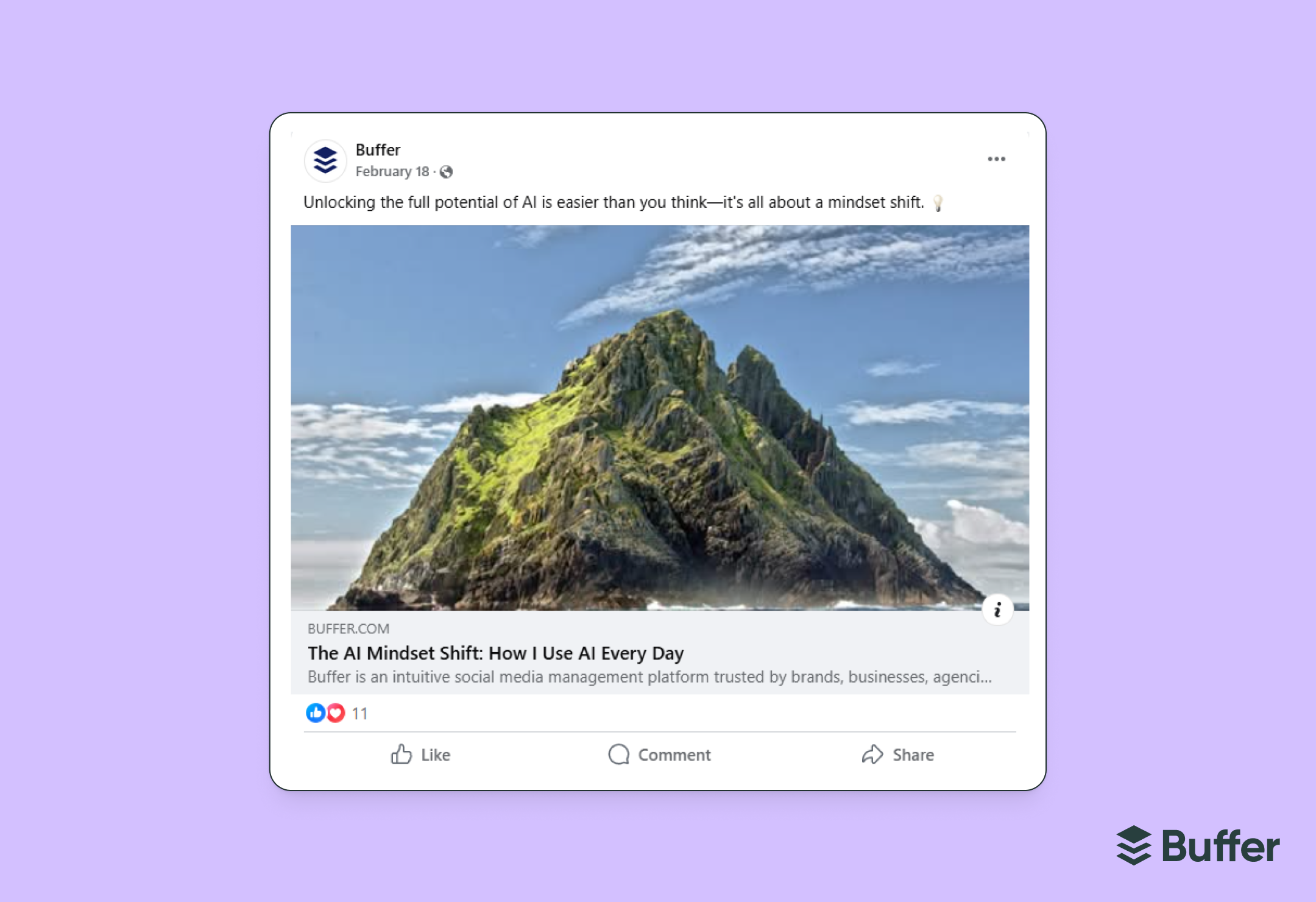
Facebook Stories
A Facebook Story is a vertical image or video that uses the entire screen of mobile phones, and it disappears after 24 hours. Stories are also available (and popular) on Instagram, WhatsApp, and Facebook Messenger.
Stories lend themselves well to casual content like fun questions, interesting links, polls, and anything to keep people engaged. “Stories also do well when I’m selling workshops — people usually DM me directly when I launch through stories,” Aiza says.
Reels and video posts
Video content, especially short-form, thrives on Facebook and grabs attention easily as videos play automatically.
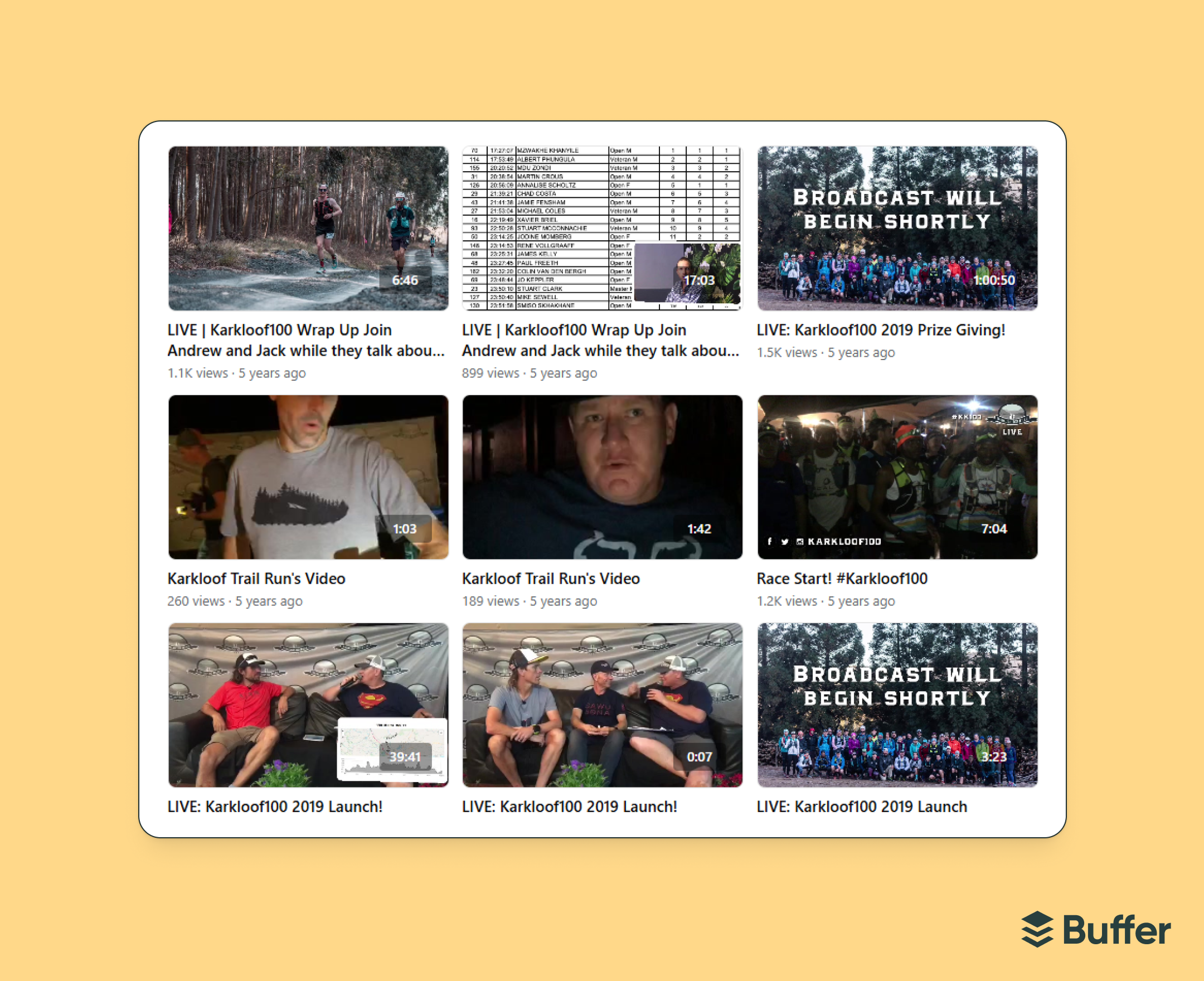
Facebook videos play automatically, so it’s even easier to grab people’s attention. It doesn’t have to look professional, either. Casual videos taken on a phone feel authentic to viewers and can help build connections.
Use video to show:
- New products in action
- Behind-the-scenes footage
- Q&As
You can even use live videos for real-time engagement with your fans. I used a lot of live videos when I was covering a trail run event. People who couldn’t be there in person loved to see key moments like the race start and the winners coming through the finish line.
Image carousels
Carousels let you share multiple images in a single post — perfect for telling a story, showing off a collection, or walking people through a process step by step. They encourage swipes, which can boost engagement and time spent on your content.
Try using carousels for:
- Tutorials
- Product features
- Before-and-afters
- Anything that works best with a visual sequence
Pro tip: Experiment with the different post types to discover what works best for your brand.
Best practices and Facebook marketing tips
Social media should be just that: social. Think of Facebook like a dinner party — you’re here to connect, not just sell. That means showing up consistently, being helpful, and maintaining a two-way conversation. Mix up your post types, respond to comments and DMs, and always ask: Would I stop scrolling for this? If not, tweak it.
Make sure your photos and videos are the right size
Facebook offers endless creative possibilities, and getting your photo and video sizes right is the first step to making your content shine.
Recommended video and image sizes for Facebook posts
Video content on Facebook doesn’t have to look like it’s come straight out of a Hollywood studio, but it does need to fit the format.
Here’s what works best:
- Square (1:1) — 1,080 x 1,080 px → Great for feed posts and easy to repurpose for Instagram, too.
- Vertical (4:5 or 9:16) — 1,080 x 1,350 px or 1,080 x 1,920 px → Ideal for mobile viewing, which is how most people scroll Facebook these days. Use 9:16 for Reels and Stories.
- Landscape (16:9) — 1,280 x 720 px → Best for longer-form video or when you're crossposting from YouTube.
Note that these dimensions also work great for image posts.
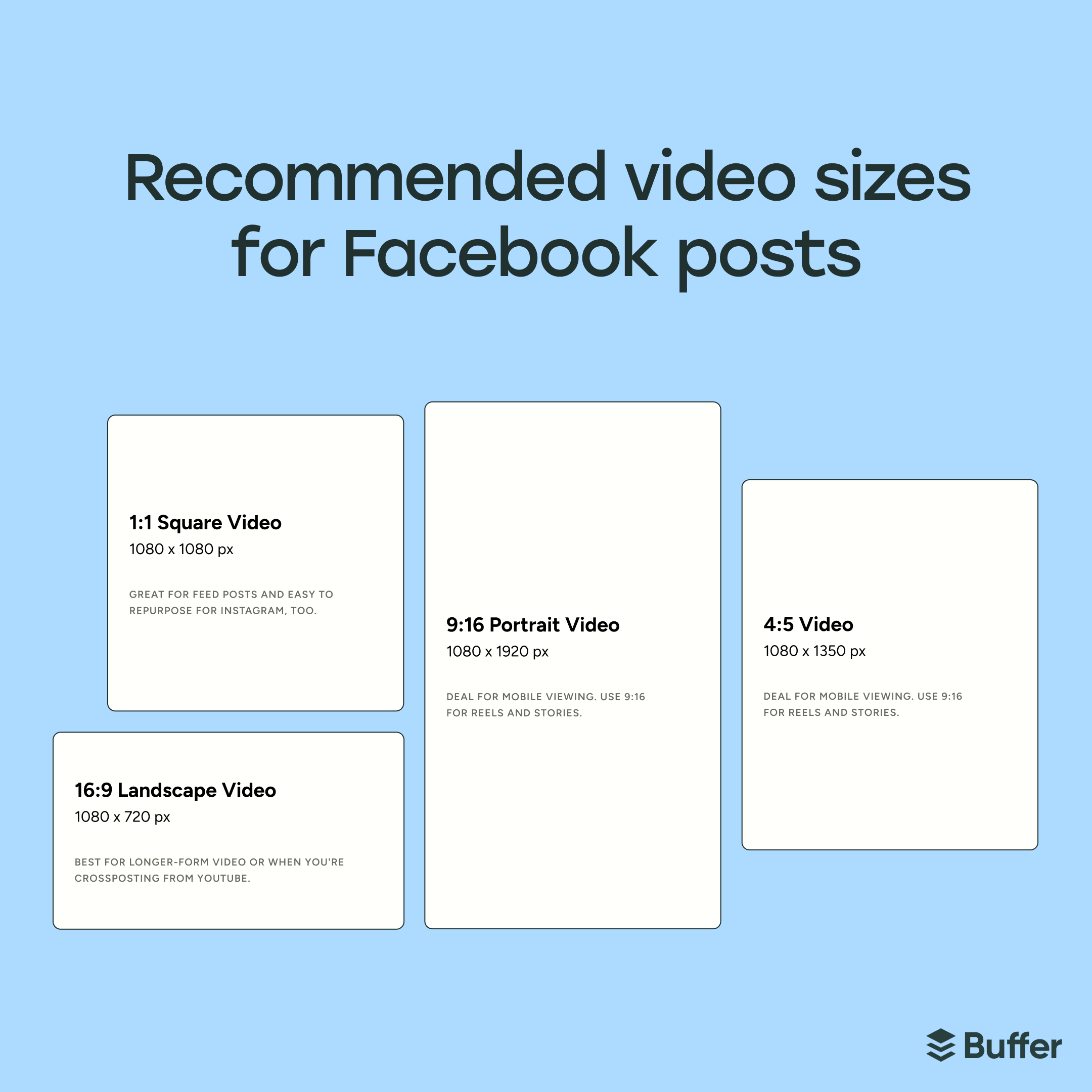
Pro tip: Keep your videos under 90 seconds so they can show up in more places on the app, including the video tab.
Pin your most helpful or essential posts
If you’ve got an important message that you want new or potential followers to see right away, you can pin it so that it’ll stay right at the top. For example, a creator could pin a welcome message or story to help new visitors quickly understand who they are and what they do. A business could include important information like hours, contact details, and service changes.
How to pin a post on Facebook
- Go to the post you want to highlight.
- Click the three dots (...) in the top right.
- Select “Pin post”.
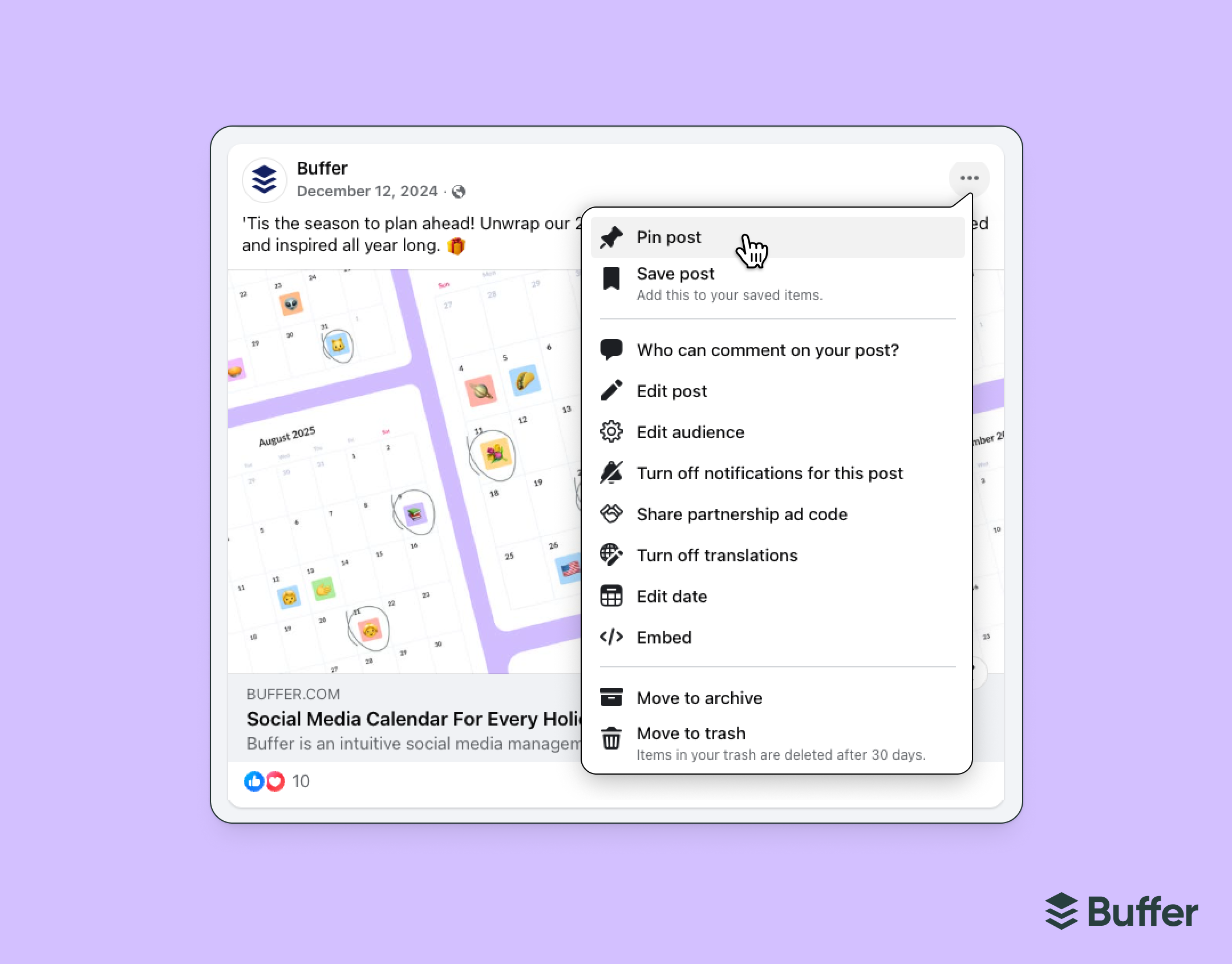
Pro tip: You can also use featured posts to highlight a selection of content at the top of your page:
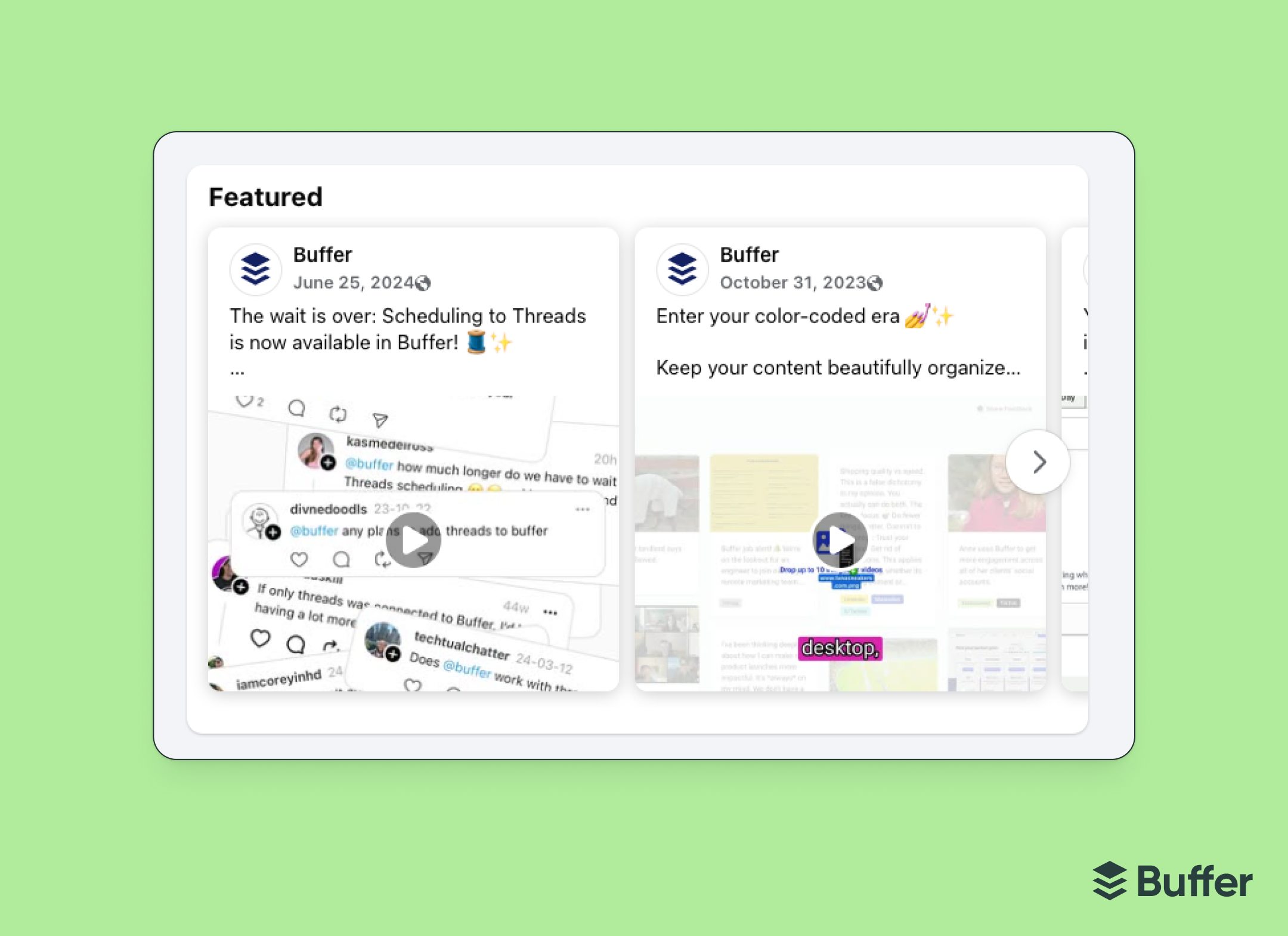
Write calls to action (CTAs) your audience can’t resist
The best CTAs sound like an invitation, not a sales pitch. Use friendly, action-oriented language, like:
- Send us a DM
- Save this for later
- Tell us your favorite in the comments
Bonus points if you make it specific:
“Shop the collection” is fine.
“Grab your cozy hoodie before they’re gone” is better.
Post at the right times for Facebook
There’s no one-size-fits-all best time to post on Facebook, as it depends on when your audience is most active. But generally, according to our research, weekday mornings (especially Tuesdays through Thursdays around 9 a.m. to noon) tend to perform well. Use analytics tools to see when your audience is online, then experiment from there.
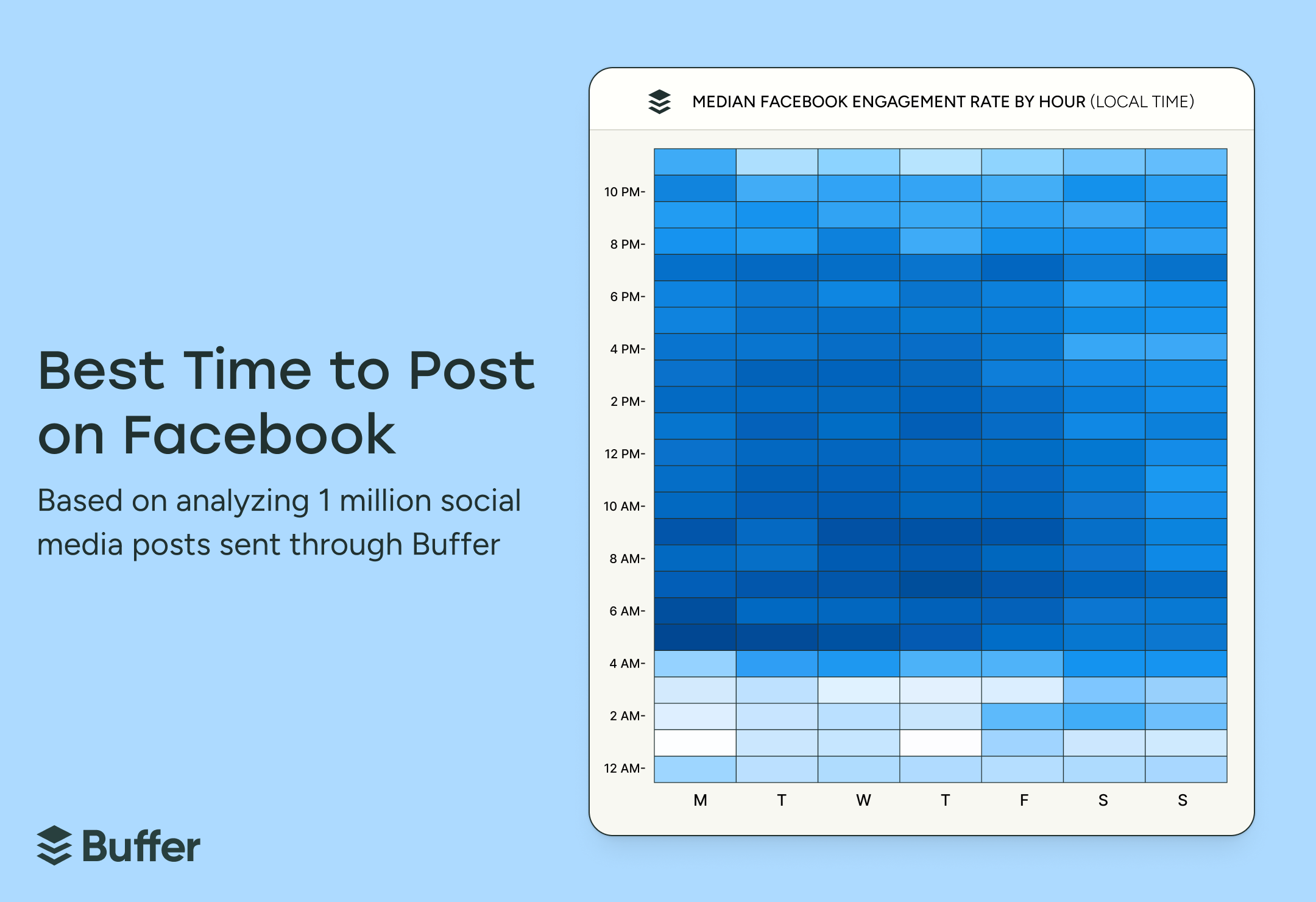
How to grow and engage your audience on Facebook
Now that you’ve got the basics and best practices down pat, it’s time to level up — so let’s talk growth and engagement.
Facebook engagement is when your audience takes an action (liking, commenting, sharing, clicking on the link) to one of your Facebook posts, Stories, or ads. It’s a sign that your content is resonating with your audience. Engagement goes hand-in-hand with growth on the platform. The more people interact with your posts, the more likely Facebook’s algorithm is to show that content to others.
According to Buffer’s brilliant data analysts, Facebook is right up there when it comes to average engagement rates; second only to LinkedIn:
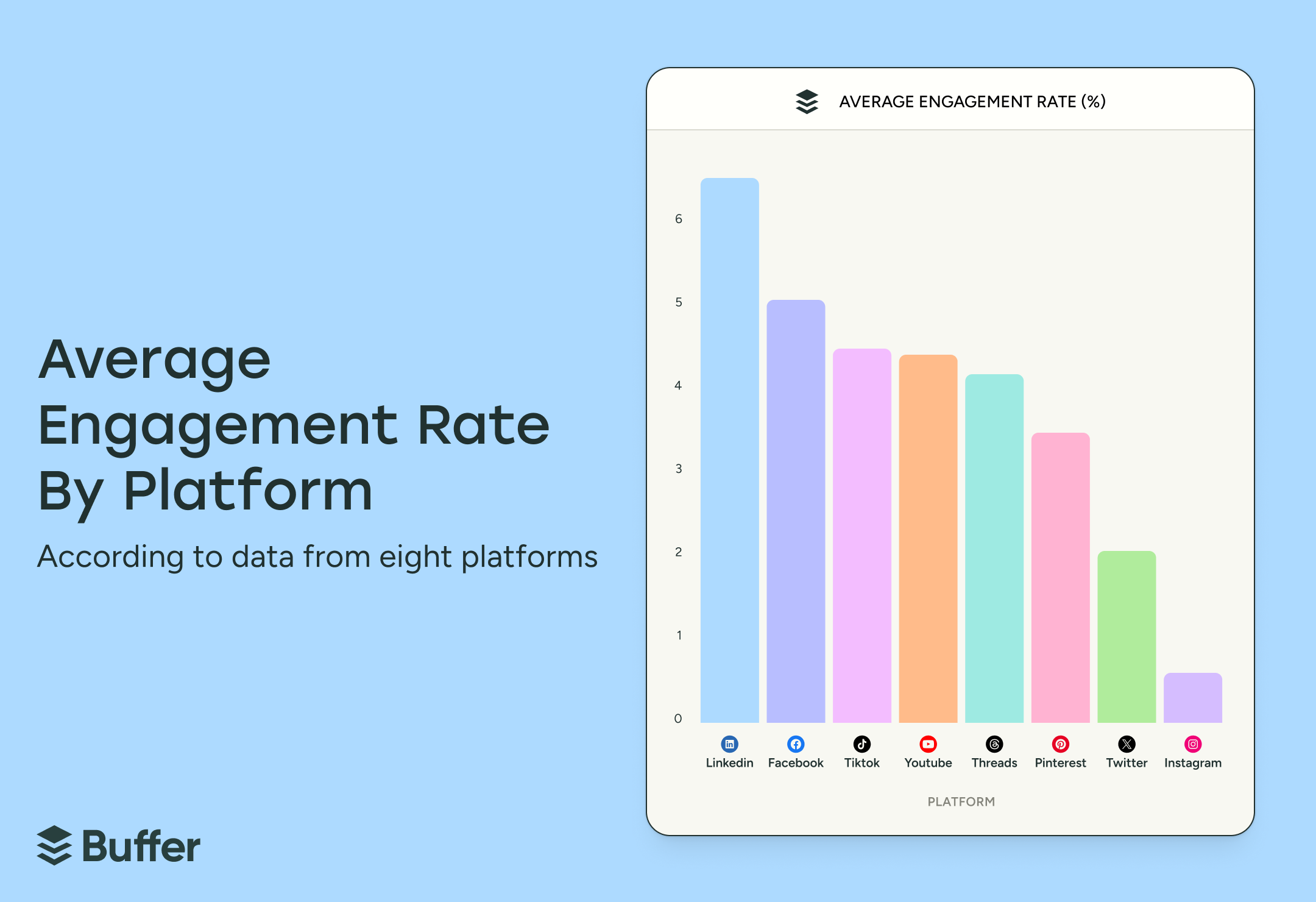
So, how do you make sure that your profile or page is hitting that 5%+ engagement?
Start posting content people care about
To win on Facebook in 2025, our top tip is to create posts that foster genuine engagement, like meaningful comments, shares, and reactions. As with any social platform, posts that feel genuine and offer real value to your audience are more likely to be favored by the algorithm.
Don’t fall into the trap of broadcasting instead of connecting. “Lean into storytelling, behind-the-scenes moments and reply to comments like actual humans. That kind of authenticity builds trust,” Cashé says.
She also points out that audiences have moved on from overly curated, beige content. “They want connection, not perfection. Facebook is where we go deeper. It’s great for storytelling, conversation, and community building, especially with longer-form posts or thought-led pieces.”
And if you’re not sure what they care about, ask them, Aiza suggests. “I run polls to ask what they want to read first, then write the newsletter and tease it back in the group. It keeps things collaborative and free-flowing, and this keeps me moving.”
Pro tip: Reuse your best posts. Not everyone saw them the first time.
Use Facebook Messenger to connect and help
Social media marketing used to just be about businesses broadcasting their marketing messages at their followers. But times have changed as brands have realized that people are not on social media to be promoted to.
When my friends ask why I love Facebook, I tell them it’s because I find it useful. I message businesses to find out more information, ask questions about my purchases, and request customer support.
As a business, creator, or entrepreneur, the easiest way to serve your customers and prospective customers through Messenger is to download the Messenger app (iOS and Android) or use http://messenger.com. With the app, you could receive and reply to your customers’ messages, just like you would with your friend’s messages.
Pro tip: Make sure your page settings allow visitors to see a “Message” button, which they can use to initiate a conversation with you on Facebook Messenger.
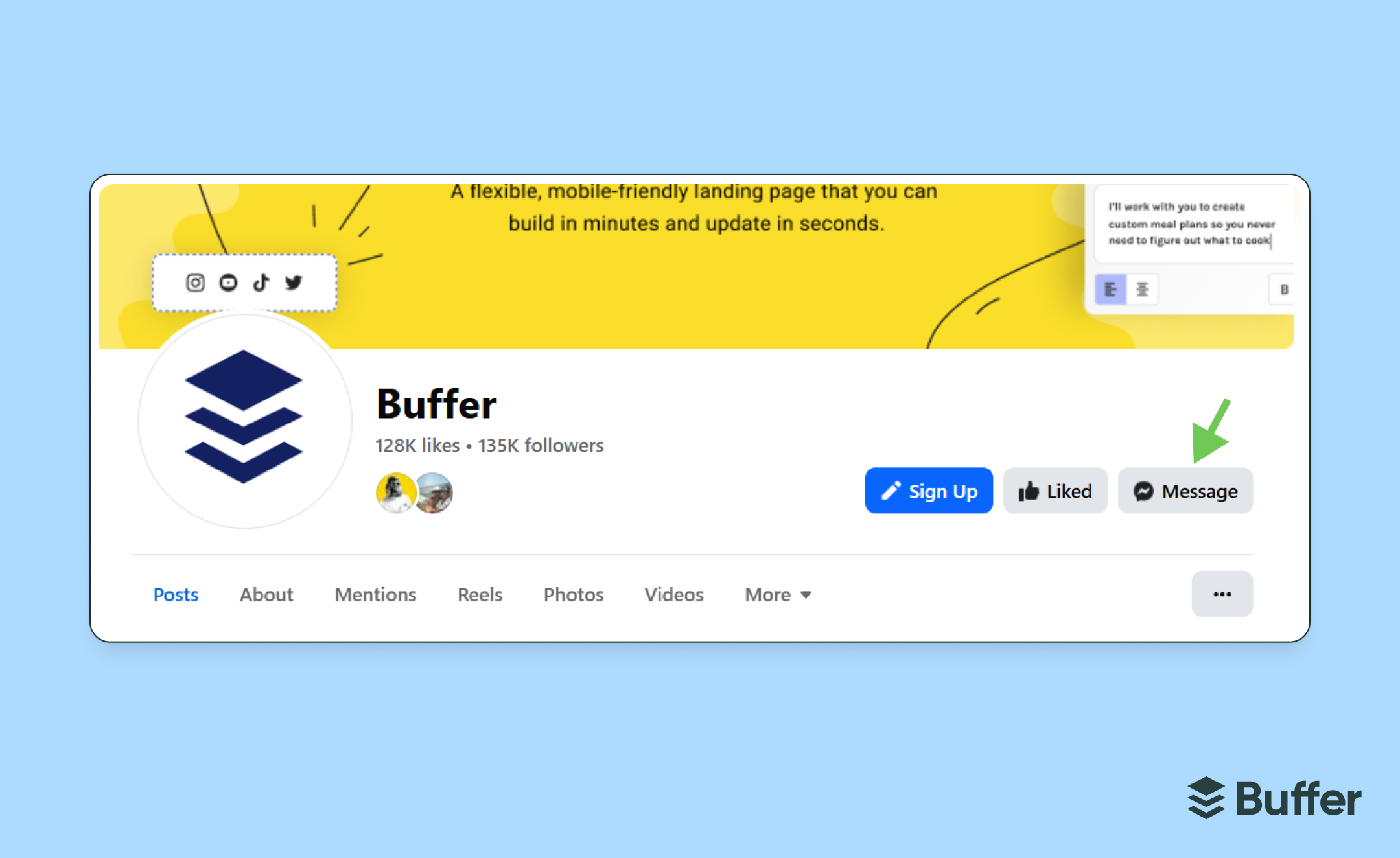
Build community with Facebook Groups
Starting a Facebook Group is one of the easiest ways to start an online community for your brand advocates, as well as increase your organic reach. Simply click “Create Group” on Facebook and fill out some basic information.
The challenge is growing the group while keeping members engaged. Depending on your brand’s goals, you could use a Facebook Group to:
- Keep people motivated through challenges.
- Offer sneak peeks or exclusive discounts.
- Act as a resource for people seeking advice around shared values.
For example, I have my own Facebook Group to engage with my community of fellow freelancers. The intent of the group is to create a space for freelancers to collaborate, share gig opportunities, solve problems, and help one another out. I’ve been using Buffer to schedule my Facebook Group posts to help keep the group active and engaged. My audience is small (or shall we say intimate?) at around 460 members, but there’s potential to go big.
Aiza co-runs multiple Facebook Groups (collectively 14k members) where she shares swipe files, builds in public, and helps Filipino freelancers sharpen their B2B and freelancing chops. She’s been promoting sold-out workshops, cohorts, and courses since 2022 — all thanks to Facebook Groups.
Keeping communities strong: a Facebook Group success story
Cashé led a campaign for a well-known national fitness brand, launching wellness-focused Facebook Groups in structured ‘heats’ that included curated meal plans, three scheduled workouts per week, and daily touchpoints from coaches and moderators to keep the energy and accountability high. The not-so-secret weapon was micro-moderation with purpose. Cashé kept a close eye on all the engagement happening in the groups, interacting at every touchpoint to make people feel heard, seen, and invested in the challenge.
“I didn’t just post and hope for the best. We all showed up daily in the comments, ran weekly check-ins, and hosted live ‘Ask the Coach’ threads where members could get real-time support, from snack swaps to mindset struggles.
Engagement skyrocketed, but more importantly, there were genuine transformation stories pouring in. The results were so strong that we scaled the format into men’s groups. That combination of structure, support, and community (and, as clichéd as it might sound), it doesn’t just build a Facebook Group; it builds a movement.”
Facebook advertising basics
Once you have mastered the basics of managing a Facebook Page, group, or professional profile, you might want to consider using Facebook ads and paid posts to reach a wider audience.
With more businesses and creators joining Facebook and sharing their content, it’s become harder (although not impossible) to reach a target audience on Facebook for free. A solution that many brands turn to is Facebook ad content, including single image or video ads, carousel ads, collection ads, and more – whatever ad format best suits your content and your goals.
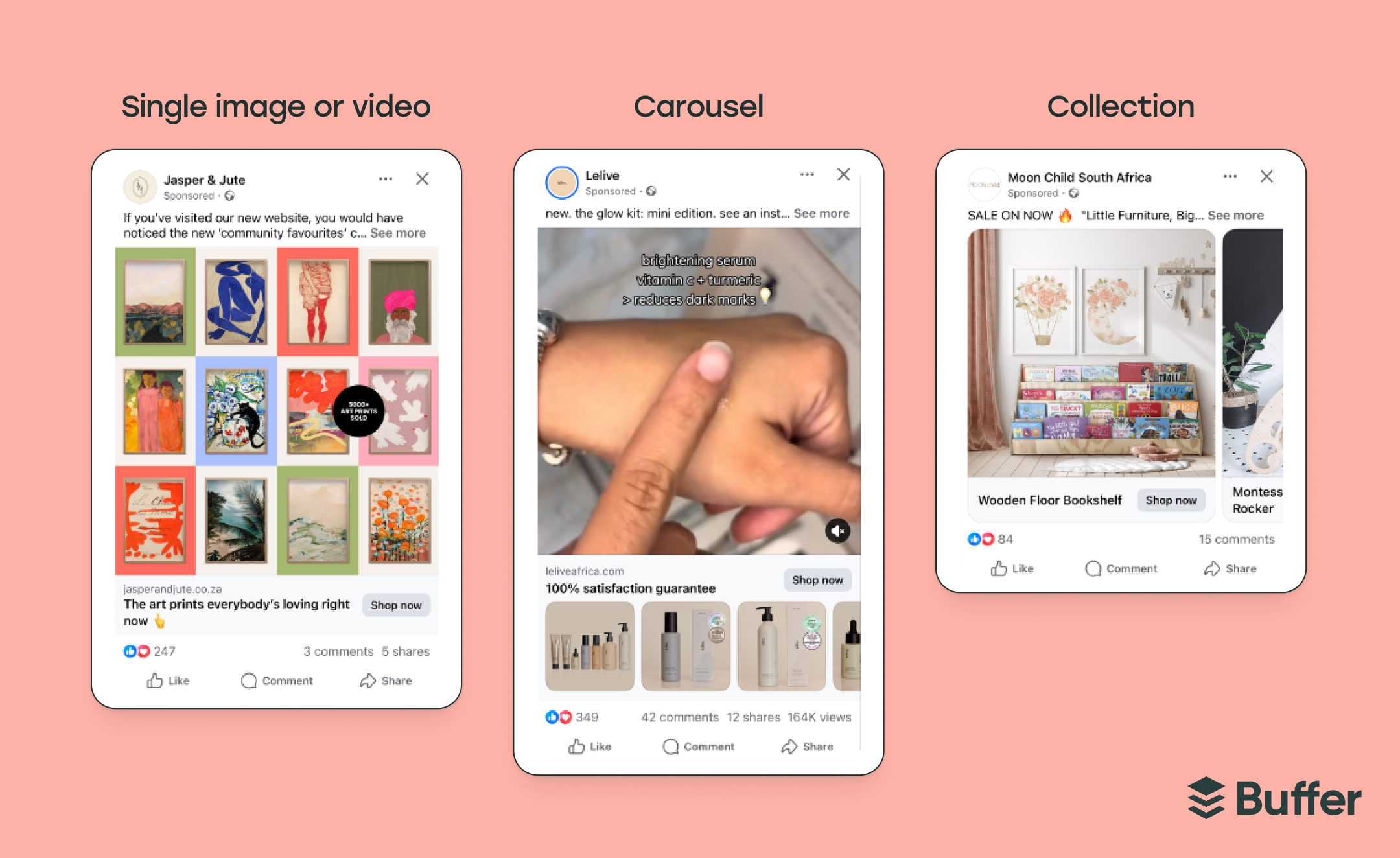
When to consider running paid advertising
Do you have a clear objective and a measurable goal in mind?
For example, you might want to increase mobile app downloads (objective) by achieving 100 downloads a month (measurable goal).
When you have a mission in mind, Facebook advertising provides the most comprehensive targeting to help you reach your specific target audience. You can specify your target audience based on their location, their demographics, their interests, their behavior, and more.
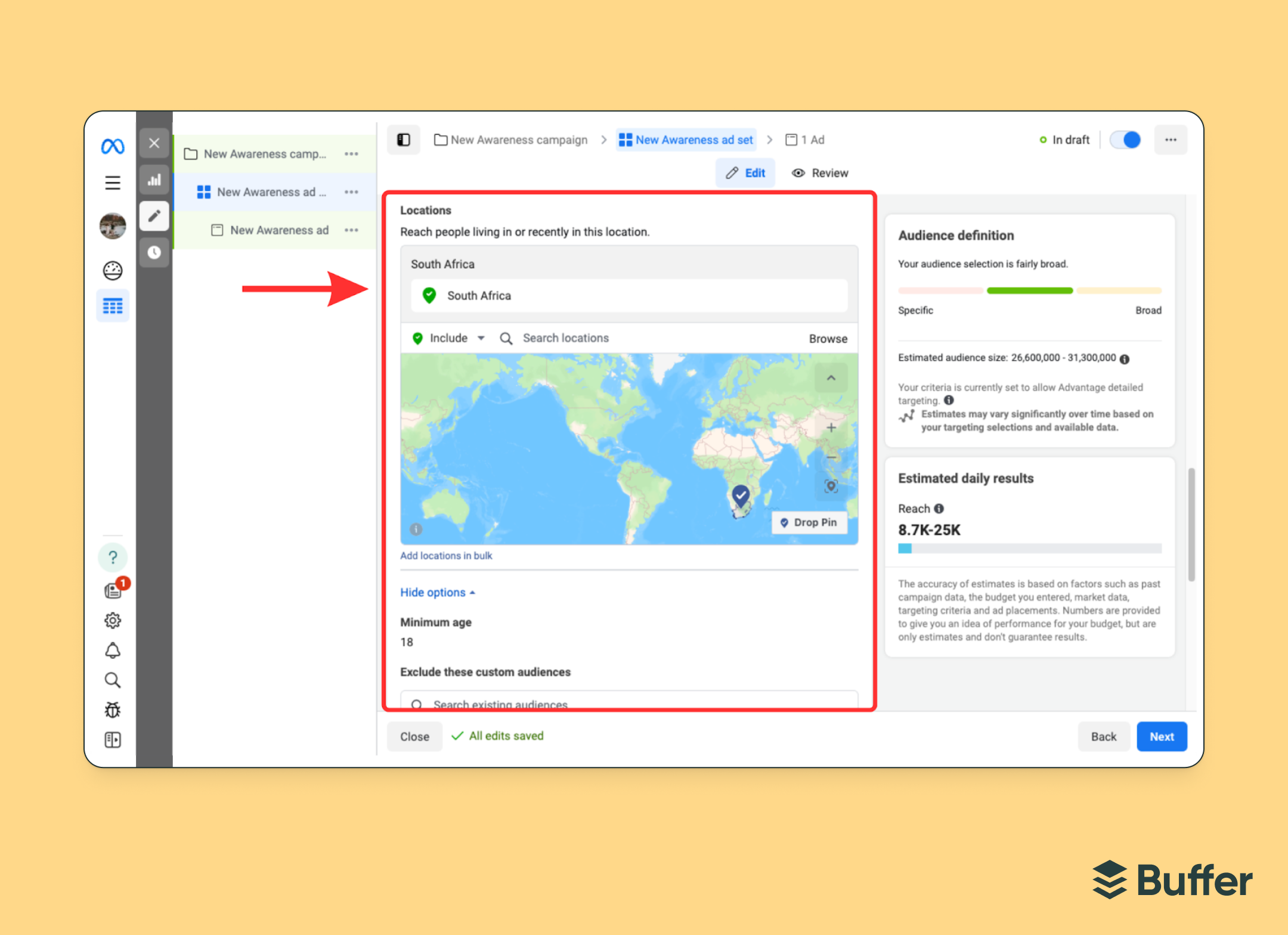
How Facebook ads work and how to set them up
Through the Facebook Ad Manager, you can create ads that’ll also show on Instagram, Messenger, and the audience network (Facebook’s network of publisher-owned apps and sites).
Here are the basic steps for running a Facebook ad:
- Choose an objective
- Select the audience you want to reach (one of the standout features of Facebook advertising is the ability to create custom audiences)
- Decide where you want to run your ads
- Set your budget (daily or lifetime)
- Pick a format (Photo, carousel, video, slideshow, or collection)
Pro tip: The best way to learn about Facebook ads is to dive right in and get started. Through experimentation, you can gradually learn what images and copy resonate the most with your audience, how to pick the right audience and ad campaign, how to allocate your ad spend, and more.
Boosted posts vs. Meta Ads Manager: what’s the difference?
Boosted posts are the quickest way to turn a regular Facebook or Instagram post into an ad. They’re great for simple goals like getting more likes, comments, or website clicks.
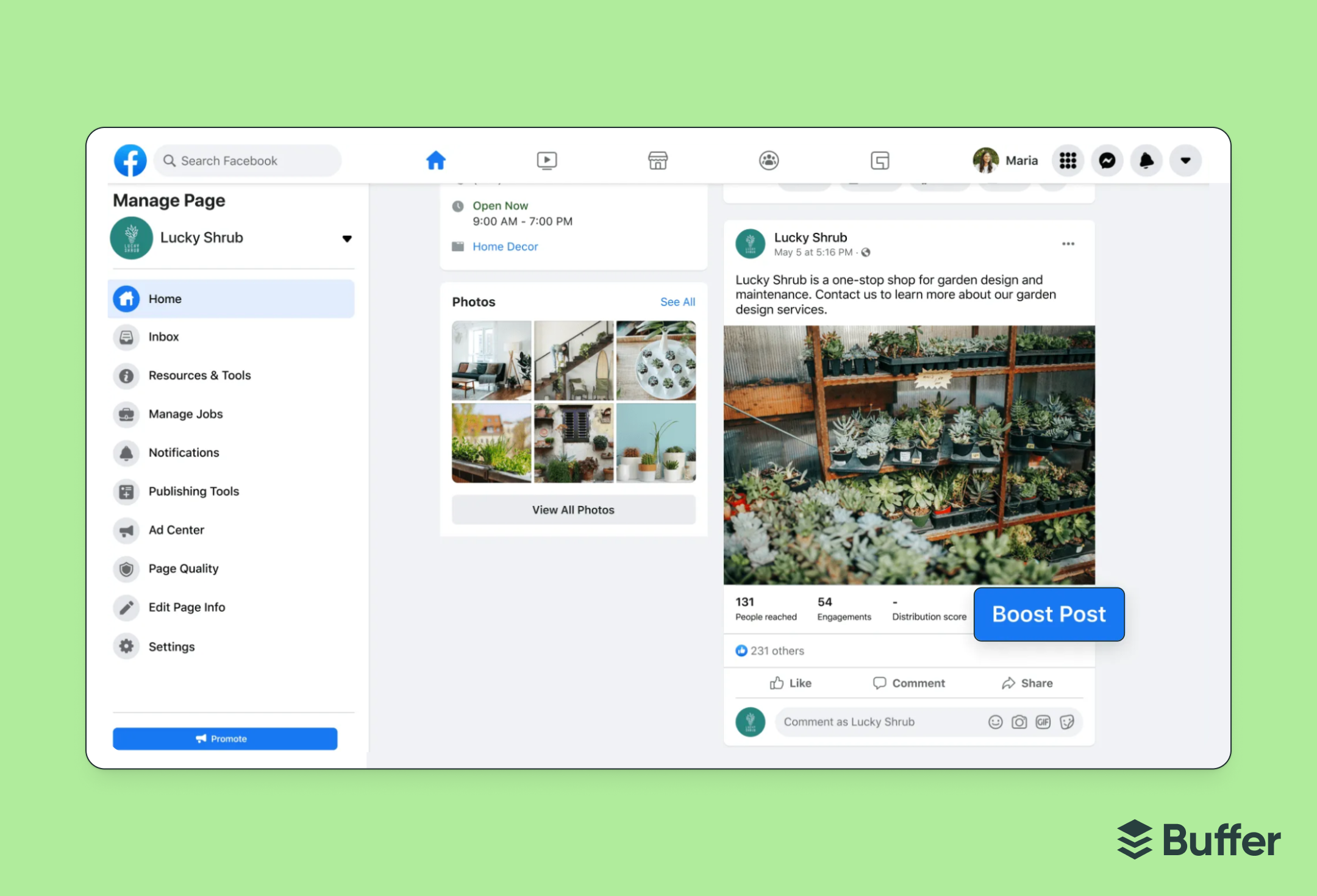
Meta Ads Manager (part of the Meta Business Suite), on the other hand, gives you more control over your ad campaigns. You can choose from a wider range of goals, get access to more detailed targeting, and customize your ad’s format and placements more precisely.
In short:
- Use boosted posts when you want easy, fast visibility for a post you’ve already shared.
- Use ads manager when you want more powerful tools to create customized, goal-driven ad campaigns.
Both can help your business grow — just choose the tool that fits your goals (and resources) best.
Track your performance with data-driven Facebook marketing
As you grow your social media presence, it’s important to check in on what’s working. With the right data, you can create more of the content your audience loves — and waste less time guessing. Here are two simple ways to track your performance:
1. Analyze your Facebook marketing with Meta
You can view your Facebook marketing performance in four ways inside Meta:
- Professional dashboard
- Meta Business Suite (only for Facebook brand or business pages)
- Meta Ads Manager (only if you run Facebook ads)
- Facebook Group insights (if you have a Facebook Group)
You’ll find information that indicates how your content is performing by tracking key metrics like reach, engagement, post performance, follower growth, and audience demographics. These insights help you understand what’s resonating with your audience so you can create the kind of content they want to see.
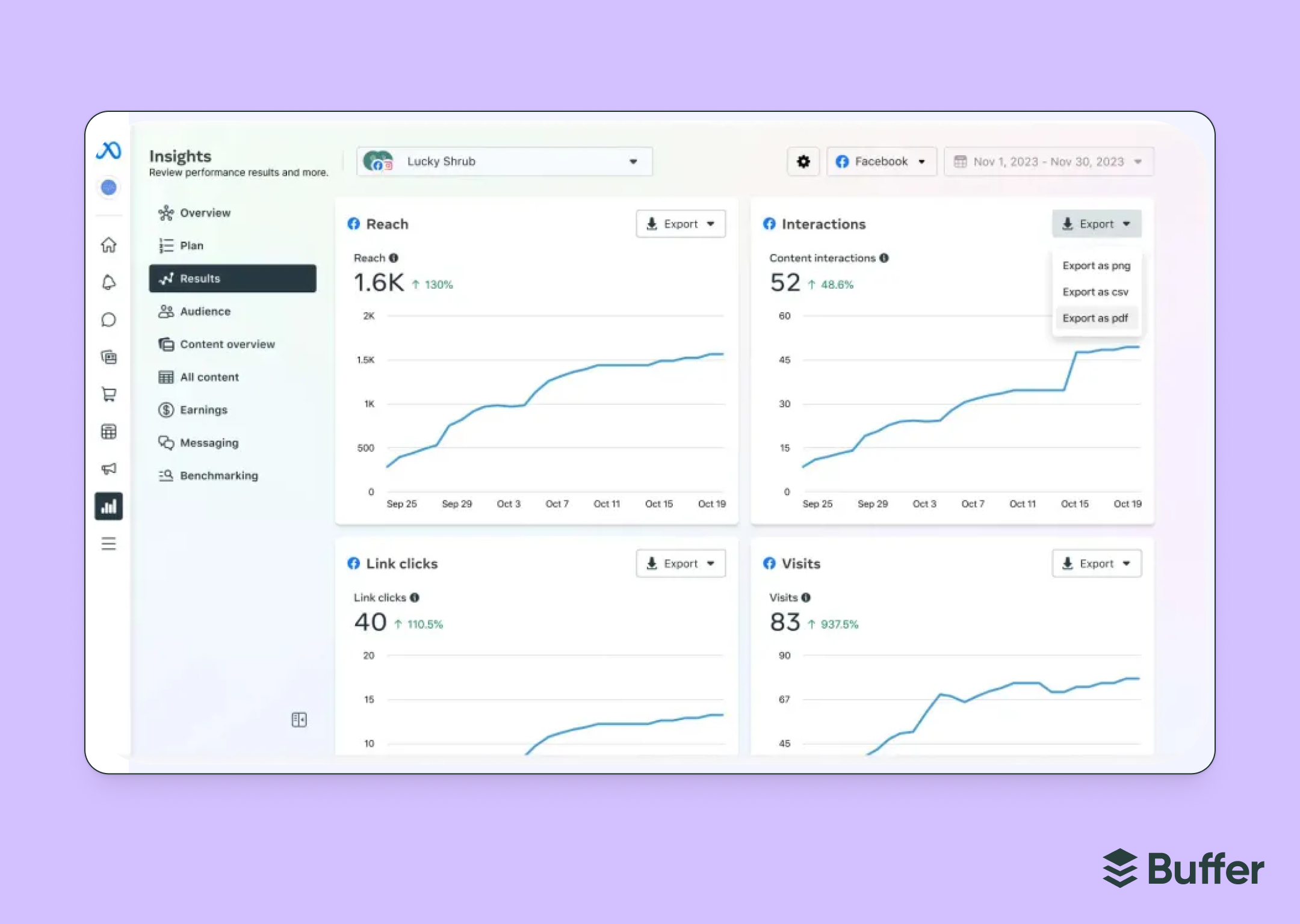
2. Analyze your Facebook marketing with Buffer
If you use Buffer to manage your Facebook business page (you’re not able to connect your professional mode profile as yet), you’ll be able to access Buffer Analyze, a clean, intuitive dashboard built for busy creators and marketers.
Buffer’s Analyze tool shows you key metrics like post reach, engagement (likes, comments, shares), clicks, and follower growth. It also highlights your top-performing posts and gives insights to help you understand what content works best with your audience.
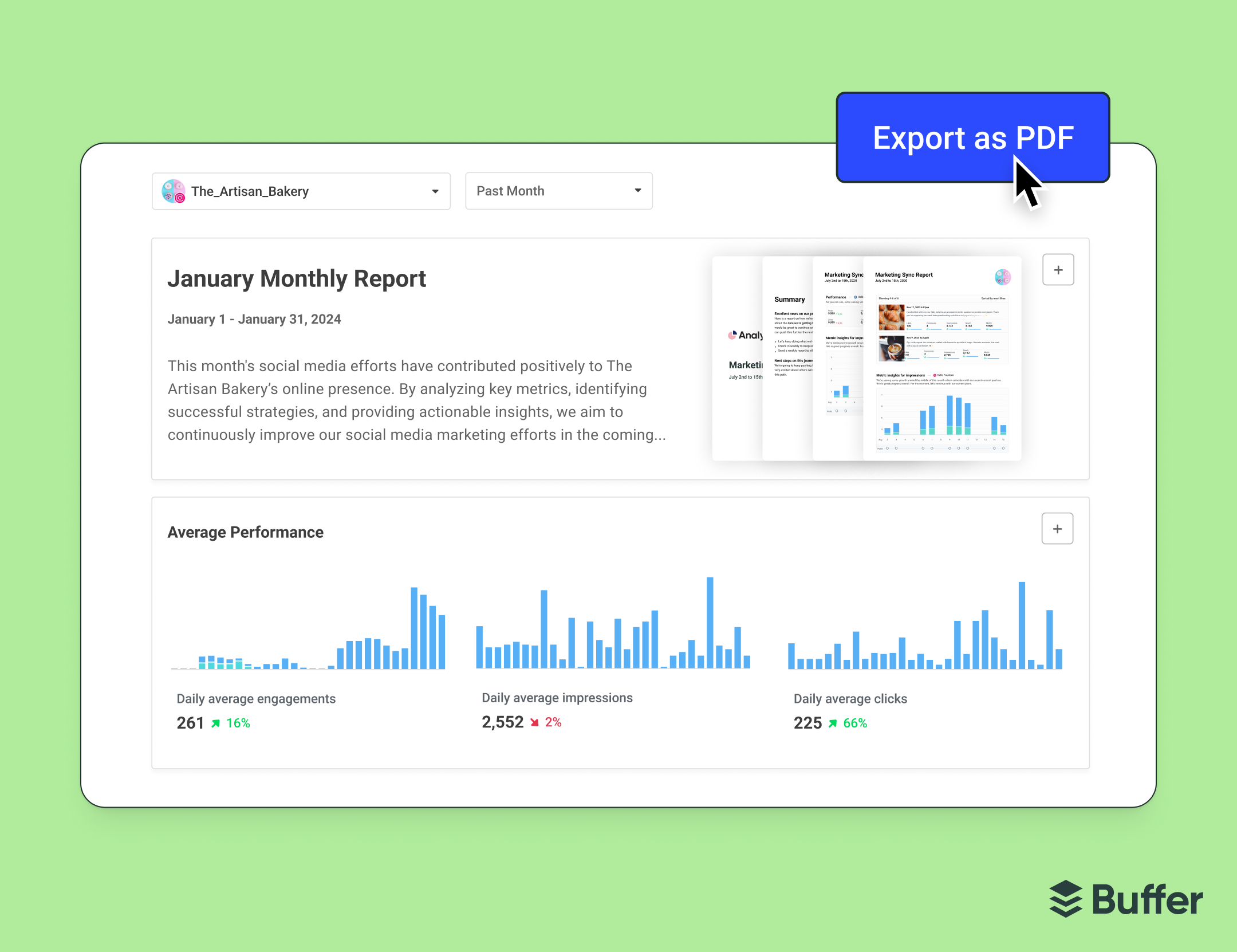
Pro tip: Adding a Facebook Pixel to your website helps you track what visitors do once they land there.
How a social media marketing tool helps you show up and stay on track
When all is said and done, the key to great Facebook marketing is great Facebook content and showing up consistently with it. As a small business or a creator, you need to make it as easy as possible to create and maintain a Facebook presence that keeps your audience informed, entertained, and engaged.
Buffer helps you simplify and streamline your Facebook presence so you can focus on what matters most: connecting with your audience. You can plan and schedule your Facebook Page’s posts weeks in advance, so you never have to worry about what to publish next or risk going silent.
Buffer’s AI Assistant can help spark content ideas and refine your copy, while built-in Facebook analytics let you see what’s working so you can do more of it. It’s like having a sidekick for your social media strategy — one that keeps you organized, on-brand, and always one step ahead.
More Facebook resources
- How to Get More Followers on Facebook for Free in 2025: 10 Tried-and-True Tactics
- Facebook Ad Specs + Image Sizes — Fully Updated for 2025
- How to Schedule Facebook Posts in 3 Easy Ways (+ Save Hours Every Week)
- Inside the Facebook Algorithm in 2025: All the Updates You Need to Know
- Best Time to Post on Facebook: We Analyzed 1 Million Posts
- Meta Ad Library 101: 7 Ways to Use the Facebook Ad Library to Improve Your Ads
Facebook marketing FAQs
How do I do Facebook marketing?
Start by setting up a Facebook Page for your brand or business. Then post regularly with behind-the-scenes updates, product tips, personal stories, and anything your audience might actually stop scrolling for. Use reels, lives, or stories to mix it up. And if you're ready, try ads to boost reach. A quick pro tip: Show up like a human, not just a logo.
Does Facebook marketing really work?
When done right, Facebook marketing helps you build a loyal audience, showcase your work, and drive people to your website landing page or shop. Like most social platforms, you can’t expect instant magic, but with consistency and a little strategy, it can work for you.
How does Facebook marketing work for business?
Facebook marketing helps you get seen, stay top of mind, and make sales. You create content that speaks to your ideal audience, engage with them through comments and DMs, and use tools like reels or targeted ads to grow. Think of it as your own storefront-meets-conversation-hub that’s open 24/7.
How effective is Facebook marketing?
When you're focused and intentional, Facebook marketing can be incredibly effective. Facebook still has one of the largest audiences around, and its tools (especially reels and groups) are made for engagement. It might take time, but it's one of the most budget-friendly ways to raise brand awareness and grow your brand online.
How do I learn Facebook marketing?
You can learn by doing, and there’s no shame in Googling along the way. Free resources like Meta Blueprint and the Buffer blog are a great place to start. Follow marketers you admire, test what works, and don’t stress about getting it perfect every time.
Is Facebook marketing worth it?
If your people are on Facebook, it’s absolutely worth it. You don’t need a huge budget to be successful; just a clear voice, a bit of consistency, and something valuable to say. Over time, you’ll build a presence that works while you sleep.
What is organic Facebook marketing?
Organic Facebook marketing involves posting updates, sharing content, replying to comments, and starting conversations in Groups without paying for ads.
What is a Facebook marketing strategy?
A Facebook marketing strategy is your plan for showing up with purpose. It outlines what you’ll post, who it’s for, how often you’ll share, and what success looks like (engagement? clicks? DMs?). A strategy also helps you stay consistent, even on busy days.
How do I create a Facebook marketing strategy?
Start with your goals: Are you building a following? Driving sales? Promoting your work? Then get clear on your audience, choose content formats you enjoy (and they engage with), and make a simple posting plan. Keep an eye on what’s working, and tweak it as you go.
Try Buffer for free
190,000+ creators, small businesses, and marketers use Buffer to grow their audiences every month.



